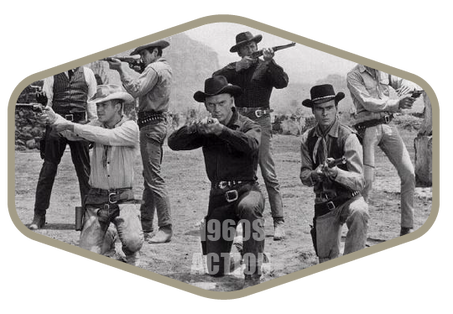The1960s was an era of cultural revolution, and the films produced in this era manifested this angst, anger and freedom of the generation. It was the era of the Vietnam war, Woodstock, political assassination and prevalent drug use.
Film studios in the '60s were at a crossroads. On one hand there was a steady decline of movie audiences due to the growing dominance of television and yet with the Hays code dissolved in 1968 - filmmakers were emboldened to push the boundaries of sex and violence and other mature themes.
In the action genre, this is evident in such films as: The Wild Bunch (1969), The Devil's Brigade (1968), An Eye for an Eye (1966), among others. Increasingly, films made in this decade were considered too mature for television - a tactic to lure audiences from their couches and back to the movie theaters.
It was also the decade that produced the so-called "Spaghetti Westerns" - notedly: A Fistful of Dollars (1964), For a Few Dollars More (1965) and The Good, Bad and the Ugly (1966). Clint Eastwood's portrayal of the "anti-hero" of these films were apt for these times. This would be a reoccurring character theme in many other Westerns and War films of this era; Bullitt (1968), Bonnie and Clyde (1967), The Bounty Killer (1965).
Noteworthy actors in the '60s action genre:
John Wayne, Glenn Ford, Clint Eastwood, Henry Fonda, Richard Widmark, Steve McQueen and Lee Marvin.
Film studios in the '60s were at a crossroads. On one hand there was a steady decline of movie audiences due to the growing dominance of television and yet with the Hays code dissolved in 1968 - filmmakers were emboldened to push the boundaries of sex and violence and other mature themes.
In the action genre, this is evident in such films as: The Wild Bunch (1969), The Devil's Brigade (1968), An Eye for an Eye (1966), among others. Increasingly, films made in this decade were considered too mature for television - a tactic to lure audiences from their couches and back to the movie theaters.
It was also the decade that produced the so-called "Spaghetti Westerns" - notedly: A Fistful of Dollars (1964), For a Few Dollars More (1965) and The Good, Bad and the Ugly (1966). Clint Eastwood's portrayal of the "anti-hero" of these films were apt for these times. This would be a reoccurring character theme in many other Westerns and War films of this era; Bullitt (1968), Bonnie and Clyde (1967), The Bounty Killer (1965).
Noteworthy actors in the '60s action genre:
John Wayne, Glenn Ford, Clint Eastwood, Henry Fonda, Richard Widmark, Steve McQueen and Lee Marvin.
ACTION & ADVENTURE FILMS OF THE 1960s
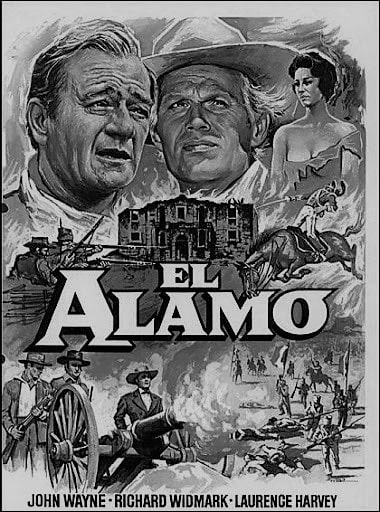 ALAMO, THE (1960)
ALAMO, THE (1960) (162 Min.) Genre: 1960 ACTION, Transfer Quality: A
John Wayne's directorial debut The Alamo is set in 1836: Wayne plays Col. Davy Crockett, who, together with Colonels Jim Bowie (Richard Widmark) and William Travis (Laurence Harvey) and 184 hardy Americans and Texicans, defends the Alamo mission against the troops of Mexican general Santa Ana. There's a lot of macho byplay before the actual attack, including the famous "letter" scene in which Wayne craftily rouses the patriotic ire of his subordinates. Also appearing are Richard Boone as Sam Houston, and Chill Wills (whose somewhat tasteless Oscar campaign has since become legendary in the annals of shameless self-promotion) as Beekeeper. Wayne's production crew was compelled to reconstruct the Alamo in Bracketville, Texas, about a hundred miles from the actual site. Dimitri Tiomkin's score, including The Green Leaves of Summer, received generous airplay on the Top-40 radio outlets of America. Rumors persist that Wayne's old pal John Ford directed most of The Alamo; cut to 161 minutes for its general release, the film was restored to its original, 192-minute length in 1992.
Starring: John Wayne, Richard Widmark, Laurence Harvey, Frankie Avalon, Patrick Wayne, Richard Boone, Chill Wills, Joseph Calleia, Guinn "Big Boy" Williams | Directed by: John Wayne
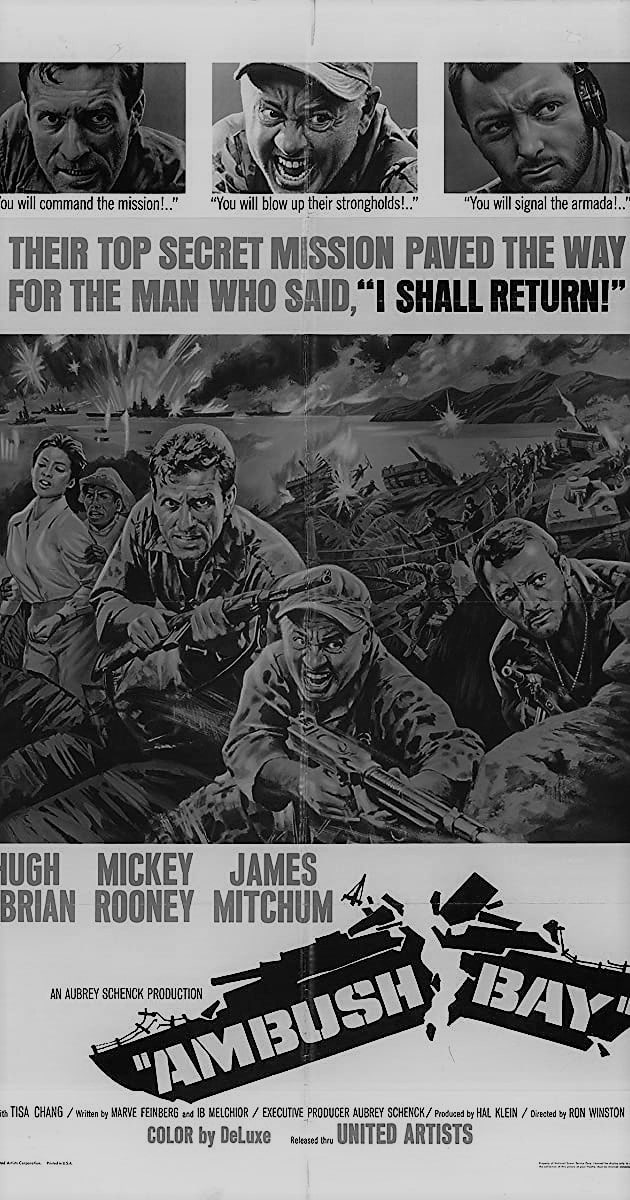 AMBUSH BAY (1966)
AMBUSH BAY (1966) (107 Min.) Genre: 1960 ACTION, Transfer Quality: B
In this WW II drama, a unit of Marines have 96 hours to make it through the dense Philippine jungle and locate a Japanese-American girl who has information needed to plan the invasion of the Japanese-occupied island.
Starring: Hugh O'Brian, Mickey Rooney, James Mitchum, Peter Masterson | Directed by: Ron Winston
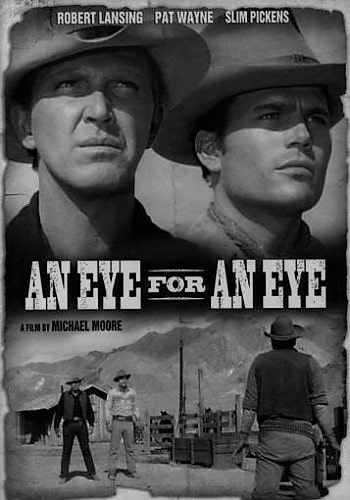 AN EYE FOR AN EYE (1966)
AN EYE FOR AN EYE (1966) (92 Min.) Genre: 1960 ACTION, Transfer Quality: A
Talion is the alternate title for the blood-splattered western An Eye for an Eye. You know that the filmmakers aren't kidding around when, in the very first scene, outlaw Slim Pickens puts a bullet into a squalling baby! Robert Lansing plays Talion, a homesteader who, after his ranch is burned to the ground and his wife and child are murdered, hires bounty hunter Pat Wayne to track down the killers. The men are forced to rely upon each other when Lansing's gun hand is shattered in a shoot out and Wayne is blinded during a confrontation with the outlaws. Lansing and Wayne combine into one single, unstoppable killing machine. Talion was co-scripted by Bing Russell, father of film star Kurt Russell.
Starring: Robert Lansing, Patrick Wayne, Slim Pickens, Gloria Talbott, Strother Martin, Clint Howard | Directed by: Michael Moore
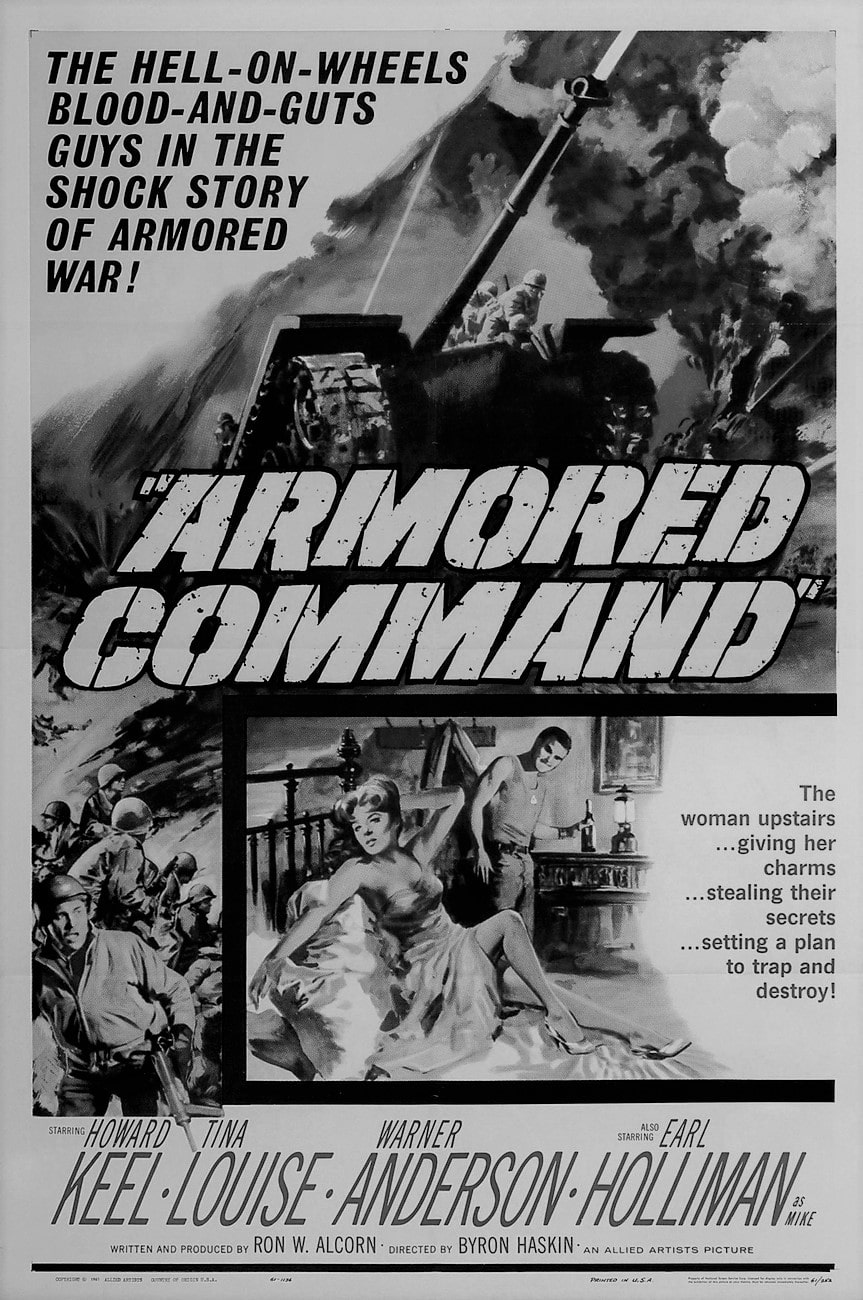 ARMORED COMMAND (1961)
ARMORED COMMAND (1961) (105 Min.) Genre: 1960 ACTION, Transfer Quality: B
In December of 1944, while the Battle of the Bulge rages in the Ardennes, the American 7th Army settles in to what most of its officers and men figure to be a routine and peaceful occupation of the Vosges-Alsace area. The region is mountainous and treacherous, and there are still German forces nearby, but everyone from division intelligence on down figures those forces to have been stripped to support the Ardennes offensive — everyone except Col. Mark Devlin (Howard Keel), who keeps reminding everyone that the Germans would never leave their forces stretched that thin so near their own border; but his warnings fall on deaf ears. Meanwhile, at the front lines, an infantry platoon finds a woman wounded in the snow. Alexandra Bastegar (Tina Louise) is an Alsatian and speaks all the local languages and dialects, which is more than the American interpreters can do, and she's only too happy to help the people who rescued her — except that she was shot as a cover and is working on behalf of the Germans. Can Devlin find the proof he needs of a German offensive-in-the-making before Alexandra completes her mission?
Starring: Howard Keel, Tina Louise, Warner Anderson, Earl Holliman | Directed by: Byron Haskin
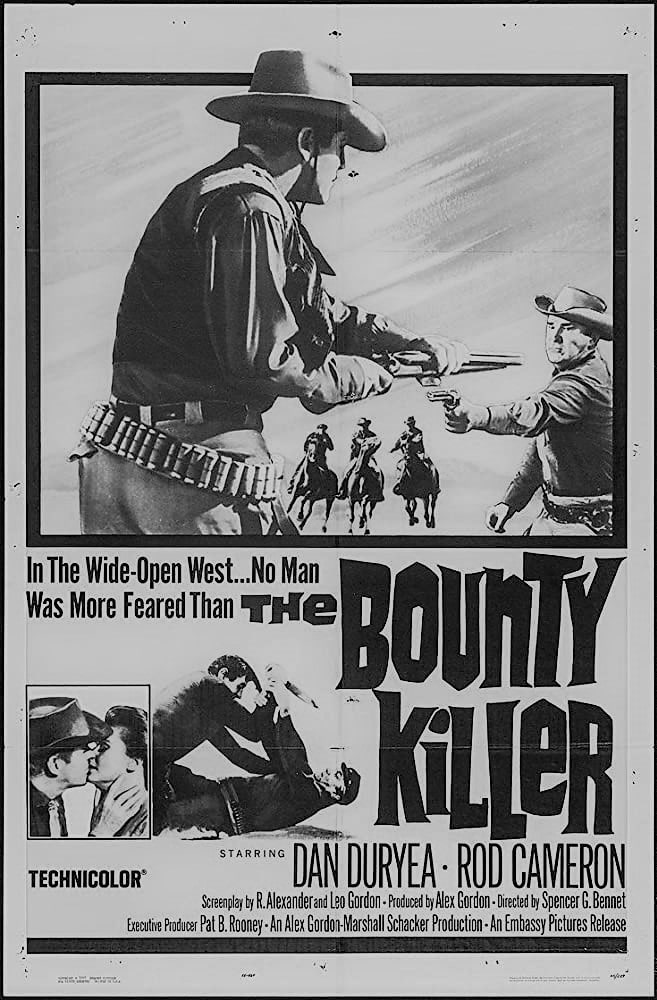 BOUNTY KILLER, THE (1965)
BOUNTY KILLER, THE (1965) (93 Min.) Genre: 1960 ACTION, Transfer Quality: B
Dan Duryea plays a Western bounty hunter, expert in his job, but ill at ease with his conscience. He is shunned by the "good" townsfolk until they need him to track down and kill a criminal; the gratitude doesn't last long, and it's back to outcast status for Duryea. At one juncture, the embittered bounty hunter delivers a condemnation against the "hypocrites" who hire him -- but nonetheless takes one more job. Ultimately, Duryea meets his end at the hands of a younger man (Peter Duryea, Dan's son), who becomes a bounty hunter himself, starting the cycle all over again. Produced very economically by B-Western specialist Alex Gordon, The Bounty Killer is distinguished by Dan Duryea's superb performance and by the presence in the supporting cast of several cowboy film veterans -- including Hollywood's very first Westerner, Billy Anderson.
Starring: Dan Duryea, Rod Cameron, Audrey Dalton, Richard Arlen, Fuzzy Knight, Peter Duryea, Johnny Mack Brown | Directed by: Spencer Gordon Bennet
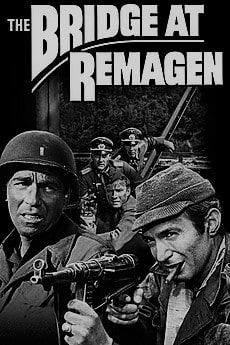 BRIDGE AT REMAGEN, THE (1969)
BRIDGE AT REMAGEN, THE (1969) (115 Min.) Genre: 1960 ACTION, Transfer Quality: B
This bleak World War II action drama, directed by John Guillermin, concerns the Ludendorff Bridge at Remagen -- the last remaining span across the Rhine into Germany during the final days of the war in 1945. German General von Brock (Peter Van Eyck) is ordered to blow up the bridge rather than let it fall into American hands. Von Brock is reluctant to carry out the orders, however, because that would mean abandoning 50,000 soldiers to the on-coming Americans. Putting Major Paul Kreuger (Robert Vaughn) in charge, he tells him to try to hold the bridge as long as possible. Meanwhile, U.S. Brigadier General Skinner (E.G. Marshall) is trying to trap the retreating Germans by making a push to the Rhine. Leading the offensive is Major Barnes (Bradford Dillman), an officer held in contempt by most of the men. Platoon leader Lieutenant Phil Hartman (George Segal) takes a particular dislike to him. Hartman is also at odds with Sergeant Angela (Ben Gazzara), a scavenger who likes to steal from the corpses of dead German soldiers. As the Americans push onward to Remagen, the Germans step up their resistance. When the Americans reach Remagen, Krueger unsuccessfully attempts to blow up the bridge and throws all his soldiers into a full-assault on the Americans. Skinner orders that the American soldiers must push forward and take the bridge intact. In the face of heavy German opposition, Hartman and Angelo find that they must put aside their differences and fight for a common cause -- to take the bridge at all costs.
Starring: George Segal, Robert Vaughn, Ben Gazzara, Bradford Dillman, E.G. Marshall | Directed by: John Guillermin
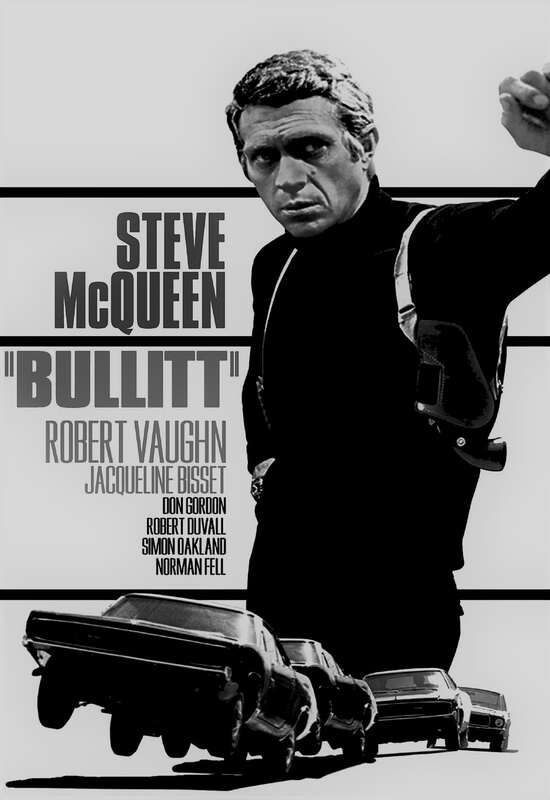 BULLITT (1968)
BULLITT (1968) (113 Min.) Genre: 1960 ACTION, Transfer Quality: A
Robert L. Pike's crime novel Mute Witness makes the transition to the big screen in this film from director Peter Yates. In one of his most famous roles, Steve McQueen stars as tough-guy police detective Frank Bullitt. The story begins with Bullitt assigned to a seemingly routine detail, protecting mafia informant Johnny Ross (Pat Renella), who is scheduled to testify against his Mob cronies before a Senate subcommittee in San Francisco. But when a pair of hitmen ambush their secret location, fatally wounding Ross, things don't add up for Bullitt, so he decides to investigate the case on his own. Unfortunately for him, ambitious senator Walter Chalmers (Robert Vaughn), the head of the aforementioned subcommittee, wants to shut his investigation down, hindering Bullitt's plan to not only bring the killers to justice but discover who leaked the location of the hideout. — Matthew Tobey
Starring: Steve McQueen, Robert Vaughn, Jacqueline Bisset, Robert Duvall | Directed by: Peter Yates
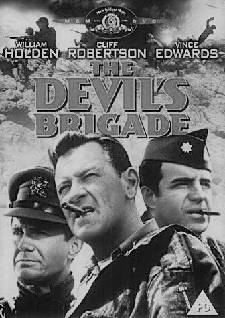 DEVIL'S BRIGADE, THE (1968)
DEVIL'S BRIGADE, THE (1968) (130 Min.) Genre: 1960 ACTION, Transfer Quality: A
During the early days of World War II, while the United States was massing its forces for the war, England hastily plans commando raids against the German forces to keep them at bay until America's troops enter the war. As a part of this plan, the Allies create the 1st Special Service Force to plan and carry out an attack on Norway in order to tie up the German forces. This commando force of Canadian soldiers and American GIs is headed by Lt. Col. Robert T. Frederick (William Holden), a paper-pusher given his first field command. Antagonism immediately erupts between Canadian Maj. Alan Crown (Cliff Robertson) and American Maj. Cliff Bricker (Vince Edwards). But Frederick utilizes their mutual dislike as a basis for a rivalry that turns this rag-tag group of misfits into a disciplined fighting force. But now that Frederick's men are ready to fight, Frederick receives word that the Norway mission has been canceled. After appealing to Washington for another assignment for the commandos, the brigade is sent on a patrol near the German lines in southern Italy. The brigade captures an enemy-held village and is then given the seemingly impossible task of taking Mt. La Difensa.
Starring: William Holden, Cliff Robertson, Vince Edwards, Andrew Prine, Claude Akins, Richard Jaeckel, Dana Andrews | Directed by: Andrew V. McLaglen
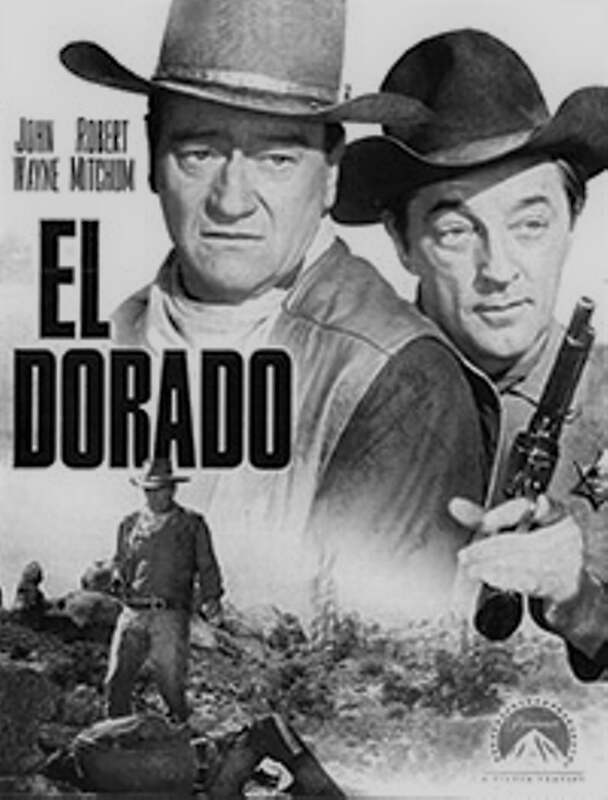 EL DORADO (1967)
EL DORADO (1967) (126 Min.) Genre: 1960 ACTION, Transfer Quality: A
Having struck pay dirt with his 1958 western Rio Bravo, Howard Hawks more or less remade the picture twice in the 1960s. The first of these rehashes was El Dorado, with Rio Bravo star John Wayne back for more. Wayne plays a gunfighter who rides into El Dorado to link up with his old pal, sheriff Robert Mitchum ("It's the big one with the big two!" declared the film's advertisements). Wayne has turned down a job with evil land baron Ed Asner, who'd hoped to drive a family off the land that he needed for its water. That family, headed by R.G. Armstrong, is convinced that Wayne is working with Asner; when Armstrong's son Johnny Crawford dies, Wayne is held responsible, earning him a bullet in the spine from Crawford's sister Michele Carey. A year passes: Wayne returns to El Dorado, in the company of his new saddle pal James Caan. They find that Asner is still up to his old tricks, and that Mitchum has descended into alcoholism. Several plot twists and power shifts ensue, leading to the slam-bang climax, with the partially paralyzed Wayne, the newly crippled Mitchum (on crutches), and the concussion-suffering Caan battling together to stave off Asner's minions. The final long-shot, of Wayne and Mitchum limping off together arm-in-arm, is one of the most enduring images in the entire Hawks canon. If they loved it twice they'll love it thrice: in 1969, John Wayne and Howard Hawks teamed up for a third Rio Bravo derivation, Rio Lobo--which, like the first two films, was scripted by Leigh Brackett. Incidentally, that's famed artist Olaf Weighorst (whose paintings appear in the title sequence) in a cameo as the gunsmith.
Starring: John Wayne, Robert Mitchum, James Caan, Charlene Holt, Ed Asner, Christopher George | Directed by: Howard Hawks
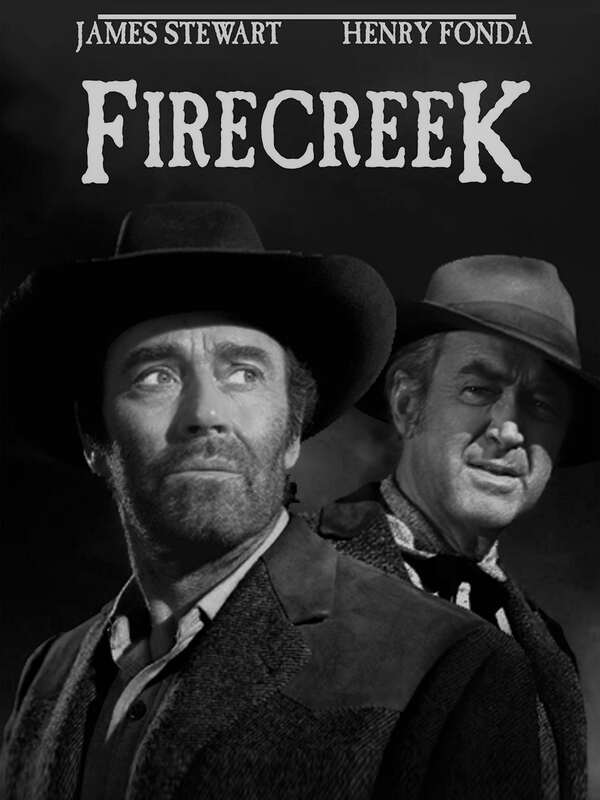 FIRECREEK (1968)
FIRECREEK (1968) (120 Min.) Genre: 1960 ACTION, Transfer Quality: A
Jimmy Stewart and Henry Fonda headline this western in which an old lawman (Stewart) attempts to keep his town safe from a band of recent returnees from the Missouri range wars and their villainous leader (Fonda), who threaten to destroy it with their drunken revelry. The old sheriff usually avoids the town, preferring to live on the outskirts of town with his pregnant wife. He is a bit of a pacifist, and when he sees what the outlaws are doing to the peaceful little village, he decides he must intervene, as no one in town seems to have the grit to fight back. At first the lawman attempts to reason with the outlaws. He fails at this, and even more violence ensues, forcing the sheriff to use a stronger form of persuasion.
Starring: James Stewart, Henry Fonda, Ed Begley, Sr., James Best, James Best, Inger Stevens | Directed by: Vincent McEveety
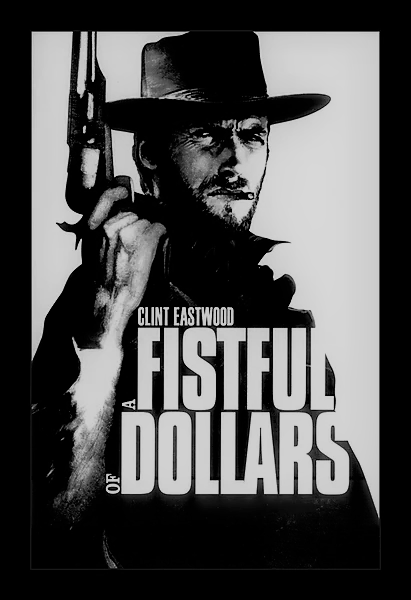 FISTFUL OF DOLLARS, A (1964)
FISTFUL OF DOLLARS, A (1964) (101 Min.) Genre: 1960 ACTION, Transfer Quality: A
By the time Sergio Leone made this film, Italians had already produced about 20 films ironically labelled "spaghetti westerns." Leone approached the genre with great love and humor. Although the plot was admittedly borrowed from Akira Kurosawa's Yojimbo (1961), Leone managed to create a work of his own that would serve as a model for many films to come. Clint Eastwood plays a cynical gunfighter who comes to a small border town and offers his services to two rivaling gangs. Neither gang is aware of his double play, and each thinks it is using him, but the stranger will outwit them both. The picture was the first installment in a cycle commonly known as the "Dollars" trilogy. Later, United Artists, who distributed it in the U.S., coined another term for it: the "Man With No Name" trilogy. While not as impressive as its follow-ups For a Few Dollars More (1965) and The Good, the Bad, and the Ugly (1966), A Fistful of Dollars contains all of Leone's eventual trademarks: taciturn characters, precise framing, extreme close-ups, and the haunting music of Ennio Morricone. Not released in the U.S. until 1967 due to copyright problems, the film was decisive in both Clint Eastwood's career and the recognition of the Italian western.
Starring: Clint Eastwood, Marianne Koch, Wolfgang Lukschy, Mario Brega | Directed by: Sergio Leone
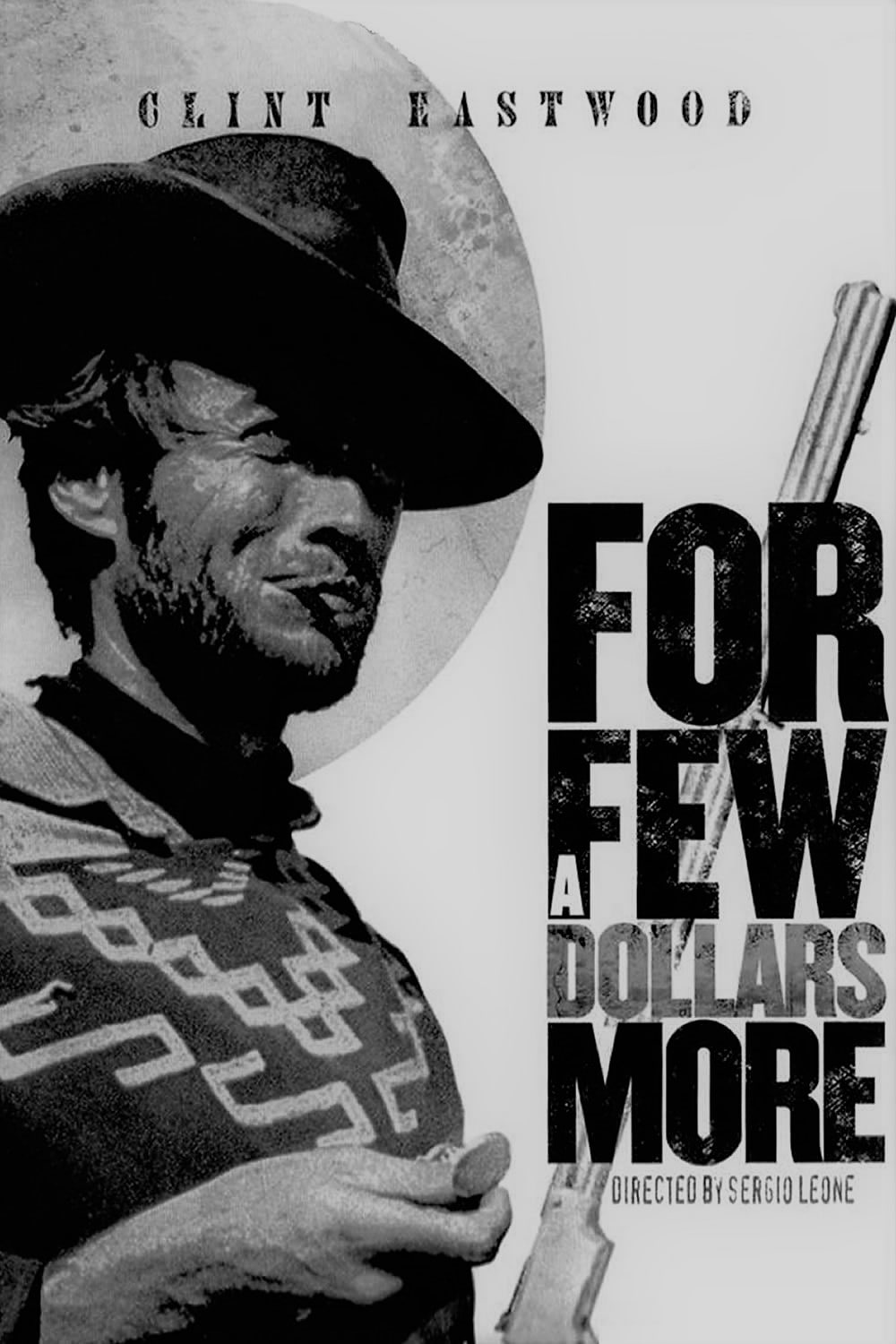 FOR A FEW DOLLARS MORE (1965)
FOR A FEW DOLLARS MORE (1965) (127 Min.) Genre: 1960 ACTION, Transfer Quality: A
This pulse-pounding follow-up to Sergio Leone's A Fistful of Dollars brings back Clint Eastwood as the serape-clad, cigar-chewing "Man With No Name." Engaged in an ongoing battle with bounty hunter Col. Douglas Mortimer (Lee Van Cleef), the Man joins forces with his enemy to capture homicidal bandit Indio (Gian Maria Volontè). Both the Eastwood and Van Cleef characters are given understandable motivations for their bloodletting tendencies, something that was lacking in A Fistful of Dollars. In both films, however, the violence is raw and uninhibited -- and in many ways, curiously poetic. Leone's tense, tight close-ups, pregnant pauses, and significant silences have since been absorbed into the standard spaghetti Western lexicon; likewise, Ennio Morricone's haunting musical score has been endlessly imitated and parodied. For a Few Dollars More was originally titled Per Qualche Dollaro in Più; it would be followed by the last and best of the Man with No Name trilogy, The Good, The Bad and the Ugly.
Starring: Clint Eastwood, Lee Van Cleef, Josef Egger, Mara Krup | Directed by: Sergio Leone
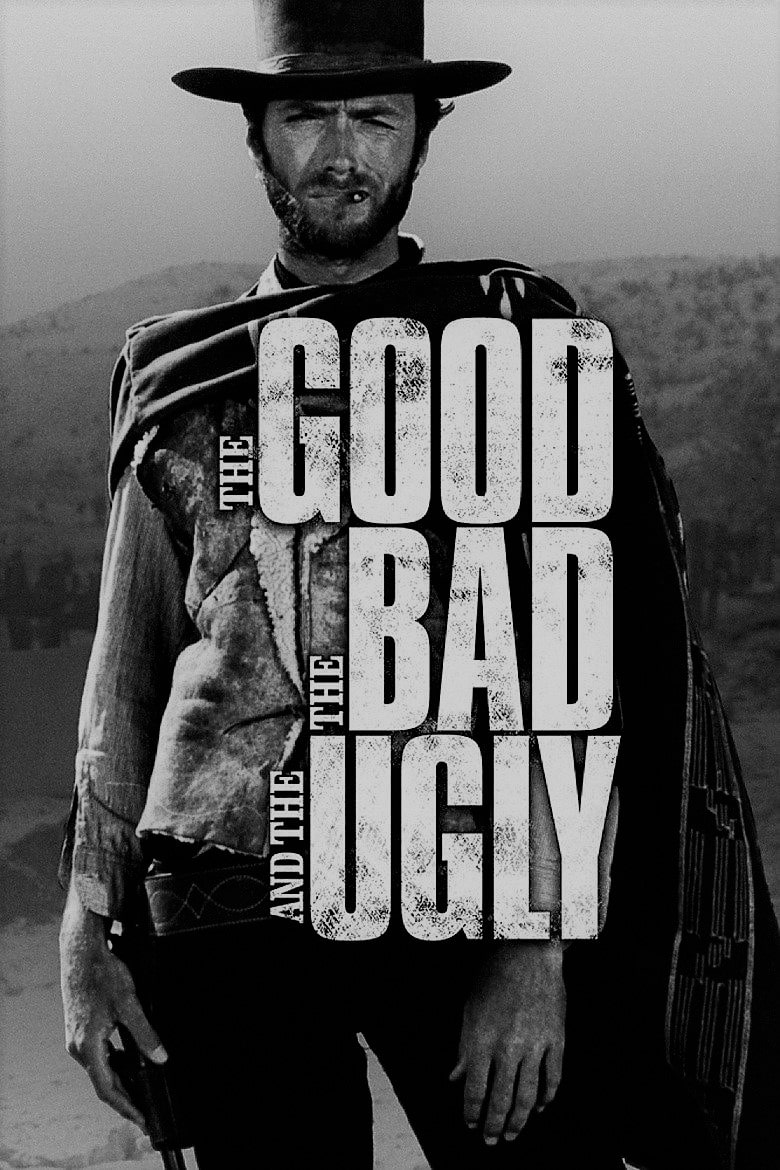 GOOD, THE BAD AND THE UGLY, THE (1966)
GOOD, THE BAD AND THE UGLY, THE (1966) (161 Min.) Genre: 1960 ACTION, Transfer Quality: A
In the last and the best installment of his so-called "Dollars" trilogy of Sergio Leone-directed "spaghetti westerns," Clint Eastwood reprised the role of a taciturn, enigmatic loner. Here he searches for a cache of stolen gold against rivals the Bad (Lee Van Cleef), a ruthless bounty hunter, and the Ugly (Eli Wallach), a Mexican bandit. Though dubbed "the Good," Eastwood's character is not much better than his opponents -- he is just smarter and shoots faster. The film's title reveals its ironic attitude toward the canonized heroes of the classical western. "The real West was the world of violence, fear, and brutal instincts," claimed Leone. "In pursuit of profit there is no such thing as good and evil, generosity or deviousness; everything depends on chance, and not the best wins but the luckiest." Immensely entertaining and beautifully shot in Techniscope by Tonino Delli Colli, the movie is a virtually definitive "spaghetti western," rivaled only by Leone's own Once Upon a Time in the West (1968). The main musical theme by Ennio Morricone hit #1 on the British pop charts. Originally released in Italy at 177 minutes, the movie was later cut for its international release.
Starring: Clint Eastwood, Eli Wallach, Lee Van Cleef, Rada Rassimov | Directed by: Sergio Leone
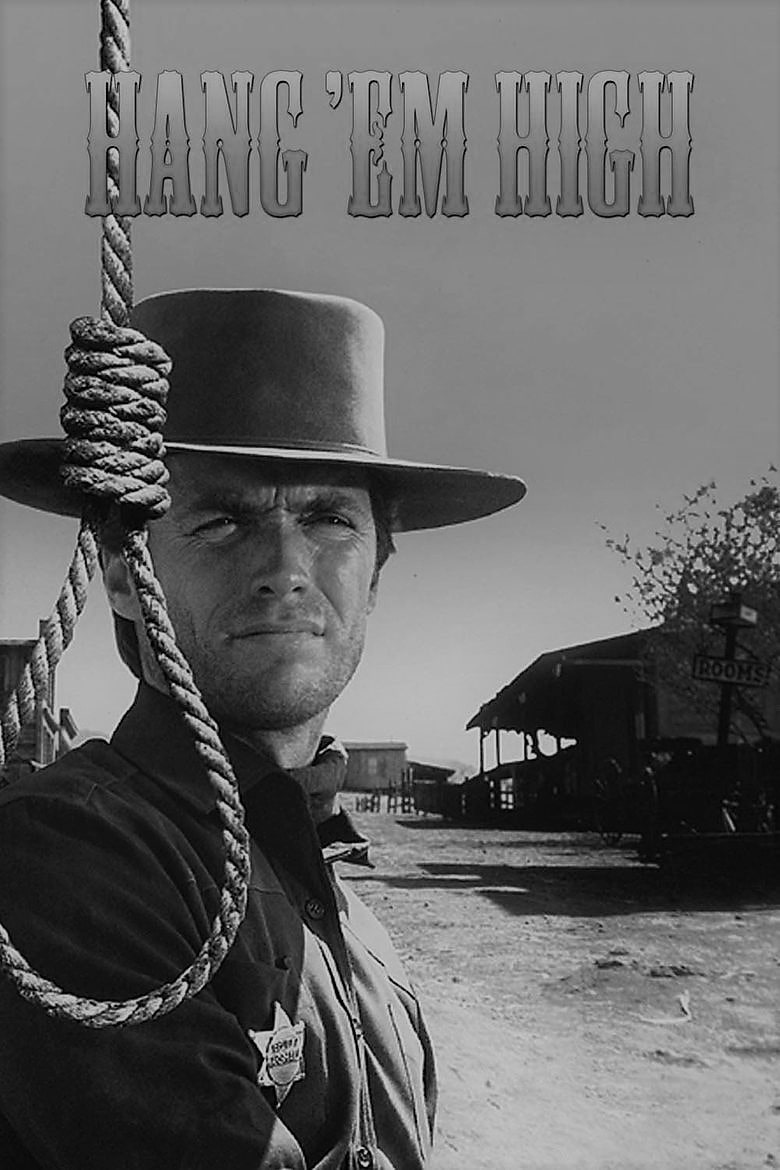 HANG 'EM HIGH (1968)
HANG 'EM HIGH (1968) (114 Min.) Genre: 1960 ACTION, Transfer Quality: A
When Hang 'em High first appeared, it was dismissed by many critics as a pale shadow of the Italian-made Westerns that Clint Eastwood had made with director Sergio Leone during the mid-'60s. In fact, the movie offered far more than was perceived by most reviewers, and a range of virtues that set it apart from the Leone films. Eastwood's portrayal of Jed Cooper, for a start, was a surprisingly subtle and complex performance, displaying a range of varied and conflicted emotions just below the surface that made his character far more fully developed than any of his prior portrayals. Pat Hingle was equally important to the movie's success, bringing a deep and serious interpretive talent to the part of Judge Adam Fenton. He was based on the real-life figure of Isaac Charles Parker (1838-1896), the judge in charge of the U.S. Court for the Western District of Arkansas, based in Fort Smith. In his 21 years on that bench, Parker issued 160 death sentences, resulting in 79 executions. His first week at Fort Smith resulted in rulings leading to a six-man hanging, very much like the one depicted in Hang 'em High, complete with a huge crowd of on-lookers, hymn-singing, and prayers, as well as massive press coverage. Eastwood and Hingle's scenes together are so good that one just wants to replay them, though Hingle's greater experience does show his performance coming from a much deeper place inside of himself than Eastwood's. They get extraordinary support by a uniformly good cast: Dennis Hopper, barely recognizable as a lunatic called "The Prophet," who dies in the opening minutes of the film; James Westerfield in a wryly ironic portrayal of a doomed prisoner; Bob Steele as the conscience-stricken Jenkins; Bruce Dern as the manipulative and bloodthirsty Miller; James MacArthur as the preacher, leading the prayers and hymns at the mass-hanging; Bert Freed as Schmidt, the taciturn hangman; Ben Johnson as Bliss, Fenton's best deputy marshal; and Michael O'Sullivan as the hapless murderer Francis Duffy, leaving this earth after giving a mournful speech, in the kind of scene that could make a career. Director Ted Post pulls all of these elements together into a graceful, compelling, spellbinding whole that's as much a serious drama as a Western, and as much an epic about the settling of the west. Very much in the manner of The Wild Bunch and William S. Hart's Tumbleweeds, among other classics of the genre, it is a personal, character-driven tale of revenge. Eastwood would make more artful and ambitious Westerns in the '70s and beyond, but Hang 'em High — which was co-produced by his fledgling company, Malpaso — was an exceptional beginning and his best work in the genre up to that time. — Bruce Eder
Starring: Clint Eastwood, Inger Stevens, Ed Begley, Sr., Pat Hingle | Directed by: Ted Post
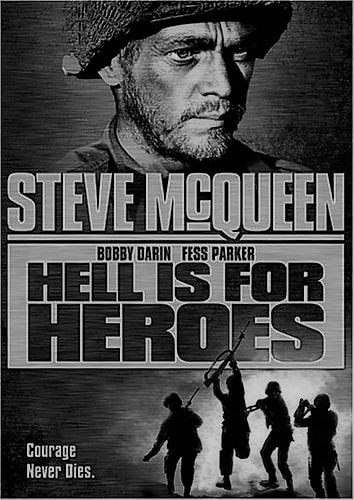 HELL IS FOR HEROES (1962)
HELL IS FOR HEROES (1962) (90 Min.) Genre: 1960 ACTION, Transfer Quality: A
Don Siegel's only war film and unfortunately his only teaming with Steve McQueen, an actor whose rebellious persona jibed well with the director's vision, it puts the star in the familiar role of antihero. His character, Reese, is an embittered G.I. who has just been sent back to join his war-weary unit holding down a position opposite a pillbox on the Siegfried Line in Belgium. Recently demoted back to private from staff sergeant for drinking, he chafes under all authority, and is a pariah to fellow grunts, despite their awareness of his extraordinary courage in battle. A natural leader, he persuades his sergeant (Harry Guardino) to implement a plan he's formulated to keep the Germans at bay by making them believe that the small outfit is larger than it is. While this is temporarily effective, Reese knows that it's only a matter of time before the enemy discovers the truth, and takes it on his own authority to lead an attack on the well-defended pillbox, although his unit has been assigned only to hold their ground. — Michael Costello
Starring: Steve McQueen, Bobby Darin, Fess Parker, Nick Adams, Harry Guardino, James Coburn | Directed by: Don Siegel
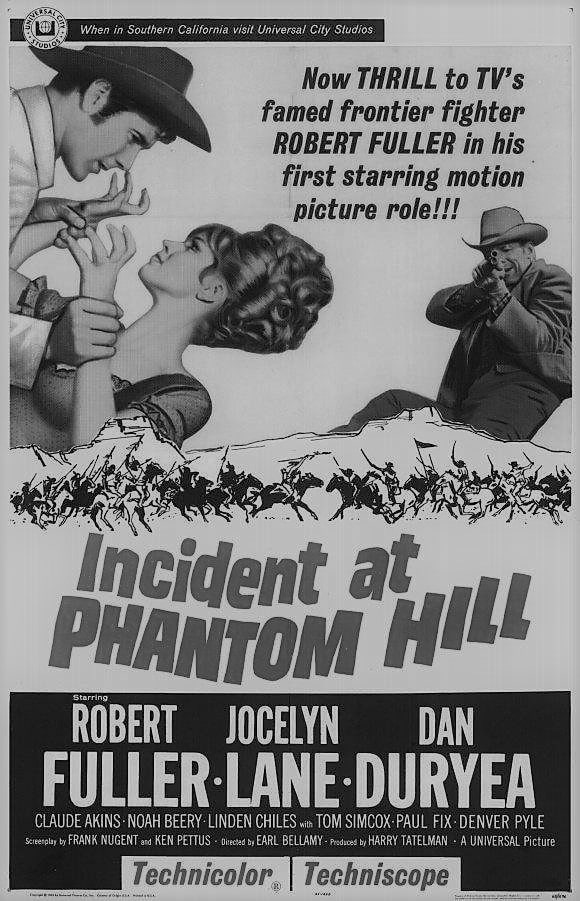 INCIDENT AT PHANTOM HILL (1966)
INCIDENT AT PHANTOM HILL (1966) (88 Min.) Genre: 1960 ACTION, Transfer Quality: C
In this western, set at the end of the Civil War, a group of rebels steal a million bucks from a Union shipment, and stash the gold in a cave near Phantom Hill, Texas. They are subsequently captured. The ring leader bargains with his captors offering to reveal the loot's location in exchange for his freedom. The Union soldiers set out to find the gold. They take the outlaw with him. An Apache attack ensues. Afterward, the outlaw gets a pair of soldiers drunk and kills them. He then flees leaving the rest of the weaponless Yankees to die. Meanwhile the outlaw finds the gold and falls in love with the Yankee leader's girl. Back in the desert, the Yankees endure another attack. The remaining two manage to catch up with the outlaw and the girl. In the ensuing battle, the girl throws the outlaws' gun to the Union leader who shoots him dead. The gold is sent back north and the lovers ride off into happiness.
Starring: Robert Fuller, Dan Duryea, Jocelyn Lane, Tom Simcox | Directed by: Earl Bellamy
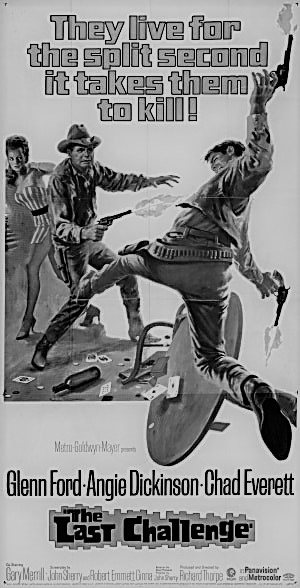 LAST CHALLENGE, THE (1967)
LAST CHALLENGE, THE (1967) (96 Min.) Genre: 1960 ACTION, Transfer Quality: A
In this western, a town sheriff contends with his reputation as the "fastest gun in the West." When a young gunslinger calls him out for a showdown, the sheriff is struck by the fellow's resemblance to himself and unsuccessfully attempts to talk him out of his foolish career choice.
Starring: Glenn Ford, Angie Dickinson, Chad Everett, Gary Merrill, Jack Elam | Directed by: Richard Thorpe
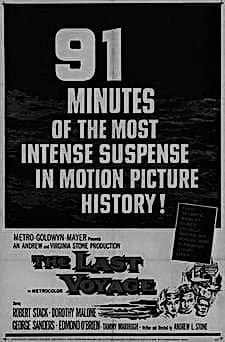 LAST VOYAGE, THE (1960)
LAST VOYAGE, THE (1960) (91 Min.) Genre: 1960 ACTION, Transfer Quality: A
Robert Stack and Dorothy Malone are Cliff and Laurie Henderson, a married couple on a vacation with their young daughter (Tammy Marihugh), taking their first sea voyage aboard the aging ocean liner Claridon. All is well for them, but not for the ship below decks, where a fire has broken out. The engine room crew, led by Chief Engineer Steven Pringle (Jack Kruschen) and 2nd Engineer Walsh (Edmond O'Brien) extinguish the blaze, but the ship's captain (George Sanders) refuses their request to shut down the boilers and check for further damage. Disaster follows as the boilers explode, taking Pringle with them and blasting a hole through to the upper decks and an opening to the sea that's not only too big to patch but allowing in too much water for the pumps to handle. Still, the Captain won't order the passengers to the lifeboats -- he hopes that the engine room crew under Walsh can hold the bulkhead and keep the ship afloat. Meanwhile, Cliff has to rescue his daughter from their wrecked stateroom, and must do what he can to help Laurie, who is trapped beneath a huge piece of steel bulkhead, while the ship slowly loses its battle with the sea.
Starring: Robert Stack, Dorothy Malone, George Sanders, Edmond O'Brien, Woody Strode | Directed by: Andrew L. Stone
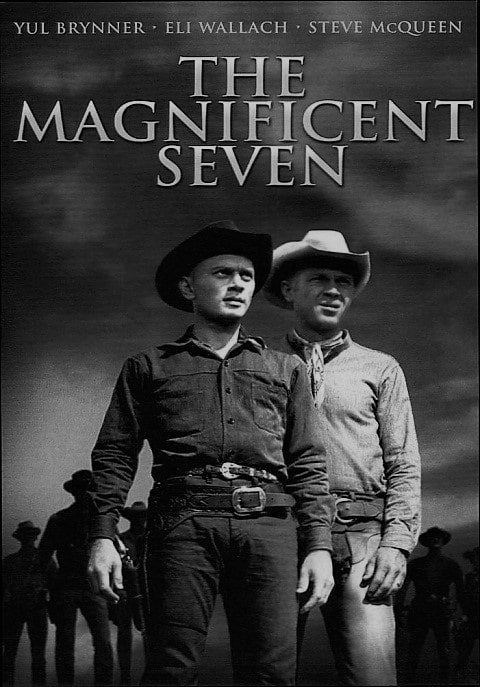 MAGNIFICENT SEVEN, THE (1960)
MAGNIFICENT SEVEN, THE (1960) (128 Min.) Genre: 1960 ACTION, Transfer Quality: A
Japanese filmmaker Akira Kurosawa's The Seven Samurai (1954) is westernized as The Magnificent Seven. Yul Brynner plays Chris, a mercenary hired to protect a Mexican farming village from its annual invasion by bandit Calvera (Eli Wallach). As Elmer Bernstein's unforgettable theme music (later immortalized as the "Marlboro Man" leitmotif) blasts away in the background, Chris rounds up six fellow soldiers of fortune to help him form a united front against the bandits. The remaining "magnificent six" are played by Charles Bronson, Steve McQueen, Horst Buchholz, Robert Vaughn, James Coburn, and (the one that everybody forgets) Brad Dexter. Though jam-packed with action, William Roberts's screenplay pauses long enough to flesh out each of its characters, allowing the audience to pick their own favorites. The Magnificent Seven was followed by three sequels, not to mention dozens of imitations.
Starring: Yul Brynner, Eli Wallach, Steve McQueen, Horst Buchholz, Charles Bronson, Robert Vaughn, Brad Dexter, James Coburn, | Directed by: John Sturges
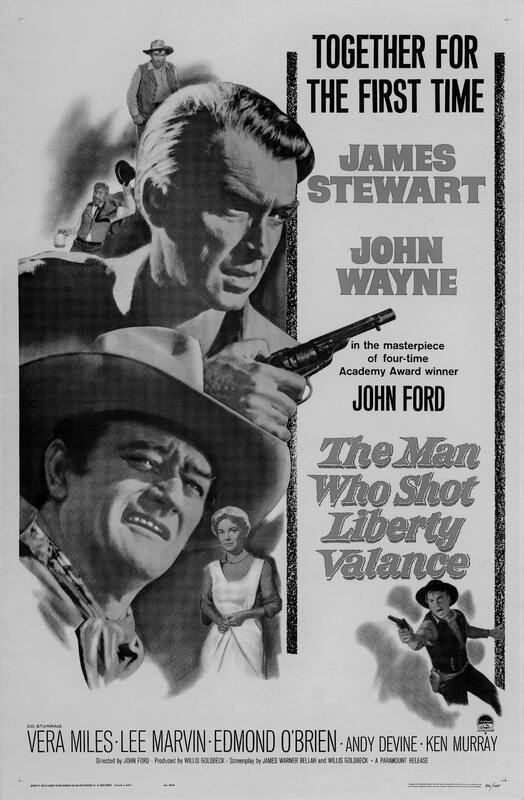 MAN WHO SHOT LIBERTY VALANCE, THE (1962)
MAN WHO SHOT LIBERTY VALANCE, THE (1962) (123 Min.) Genre: 1960 ACTION, Transfer Quality: A
Like Pontius Pilate, director John Ford asks "What is truth?" in The Man Who Shot Liberty Valance--but unlike Pilate, Ford waits for an answer. The film opens in 1910, with distinguished and influential U.S. senator Ransom Stoddard (James Stewart) and his wife Hallie (Vera Miles) returning to the dusty little frontier town where they met and married twenty-five years earlier. They have come back to attend the funeral of impoverished "nobody" Tom Doniphon (John Wayne). When a reporter asks why, Stoddard relates a film-long flashback. He recalls how, as a greenhorn lawyer, he had run afoul of notorious gunman Liberty Valance (Lee Marvin), who worked for a powerful cartel which had the territory in its clutches. Time and again, "pilgrim" Stoddard had his hide saved by the much-feared but essentially decent Doniphon. It wasn't that Doniphon was particularly fond of Stoddard; it was simply that Hallie was in love with Stoddard, and Doniphon was in love with Hallie and would do anything to assure her happiness, even if it meant giving her up to a greenhorn. When Liberty Valance challenged Stoddard to a showdown, everyone in town was certain that the greenhorn didn't stand a chance. Still, when the smoke cleared, Stoddard was still standing, and Liberty Valance lay dead. On the strength of his reputation as the man who shot Valance, Stoddard was railroaded into a political career, in the hope that he'd rid the territory of corruption. Stoddard balked at the notion of winning an election simply because he killed a man-until Doniphon, in strictest confidence, told Stoddard the truth: It was Doniphon, not Stoddard, who shot down Valance. Stoddard was about to reveal this to the world, but Doniphon told him not to. It was far more important in Doniphon's eyes that a decent, honest man like Stoddard become a major political figure; Stoddard represented the "new" civilized west, while Doniphon knew that he and the West he represented were already anachronisms. Thus Stoddard went on to a spectacular political career, bringing extensive reforms to the state, while Doniphon faded into the woodwork. His story finished, the aged Stoddard asks the reporter if he plans to print the truth. The reporter responds by tearing up his notes. "This is the West, sir, " the reporter explains quietly. "When the legend becomes fact, print the legend." Dismissed as just another cowboy opus at the time of its release, The Man Who Shot Liberty Valance has since taken its proper place as one of the great Western classics. It questions the role of myth in forging the legends of the West, while setting this theme in the elegiac atmosphere of the West itself, set off by the aging Stewart and Wayne.
Starring: John Wayne, James Stewart, Vera Miles, Lee Marvin, Edmond O'Brien, Andy Devine, John Carradine, Woody Strode, Strother Martin, Lee Van Cleef | Directed by: John Ford
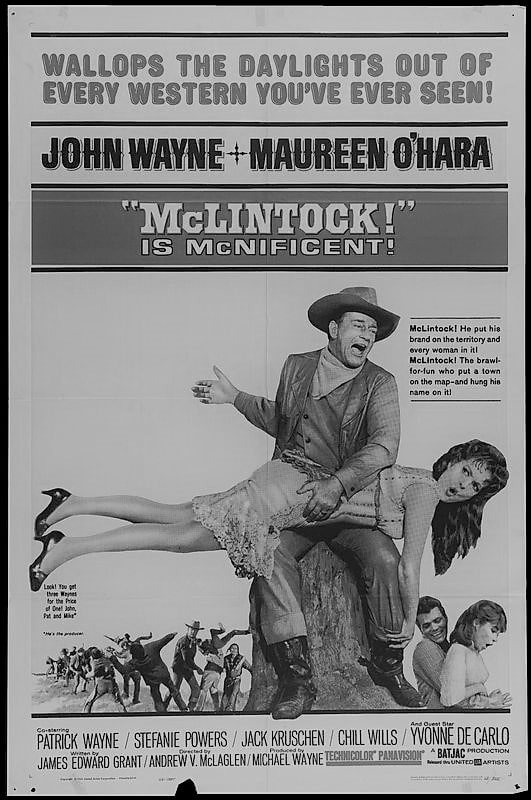 MCLINTOCK! (1963)
MCLINTOCK! (1963) (127 Min.) Genre: 1960 ACTION, Transfer Quality: A
George Washington McLintock (John Wayne) has a saddlebag full of trouble. The owner of the largest ranch in the territory, which also includes a mine and a lumber mill, all of which he built up himself, he should be a happy, fulfilled man, but he isn't — his wife Katherine (Maureen O'Hara) walked out on him two years ago without a word of explanation, and has been living back east and running in very fancy circles; he's getting older, a fact of which he's constantly reminded as friends around him decline in health; he's being challenged by their sons, eager to make their mark on the territory, and by the homesteaders who are pouring in with the support of the government, hoping to farm on land that's just barely adequate for cattle to graze on; he's got government officials underfoot, including an inept Indian agent (Strother Martin) and a corrupt land agent (Gordon Jones); the thick-headed, longwinded territorial governor, the Honorable Cuthbert H. Humphrey (Robert Lowery), and the government back east are trying to push the Indians — whose chiefs are some of McLintock's oldest enemies and his best and most honored friends — by shipping them off to a reservation, where they'll be cared for like old women; and to top it all off, Katherine is coming back to secure a divorce and take custody of their 17-year-old daughter Rebecca (Stefanie Powers), who's been at school back east and no longer likes anything to do with the west, any more than her mother does. All of that — plus the presence of a young hired hand (Patrick Wayne) who's interested romantically in McLintock's daughter — is the set-up for a sprawling comedy-western with serious overtones, part battle-of-the-sexes and part political tract. McLintock! was made mostly to keep John Wayne's production company solvent in the wake of the losses incurred from the production of The Alamo — Wayne needed a film that could be made quickly, and that would have mass-appeal, and he got more than he bargained for in James Edward Grant's screenplay, which owed a little to both The Taming Of The Shrew and The Quiet Man. Shot in the spring of 1963 and premiered in late November of that year, McLintock proved to be one of the star's most popular and successful films of the 1960's. It was a prized possession of the Wayne estate, and held unavailable for all of the 1980's, until they missed the copyright renewal in 1991 — since then, it's emerged in numerous substandard videocassette and DVD editions, but there's been no high quality, authorized version apart from a mid-1990's MPI home video VHS edition, and the print shown on WTBS. — Bruce Eder
Starring: John Wayne, Maureen O'Hara, Yvonne de Carlo, Patrick Wayne | Directed by: Andrew V. McLaglen
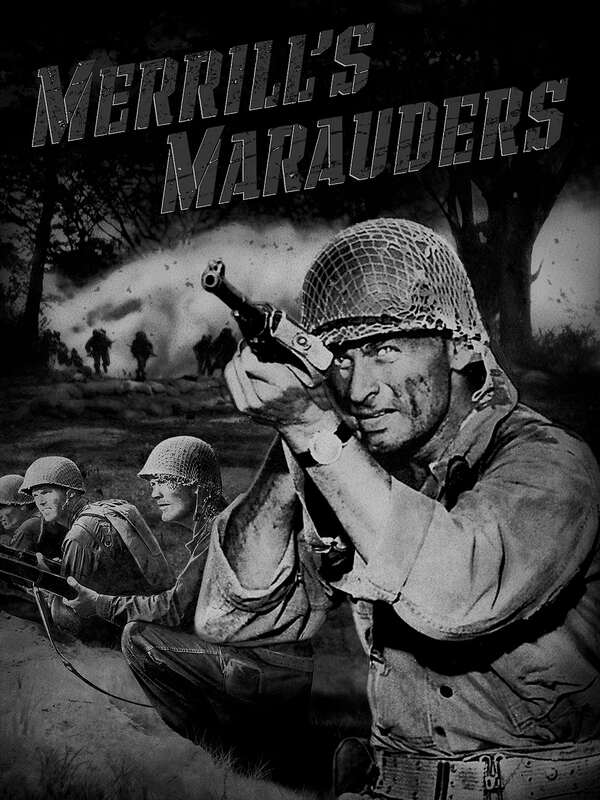 MERRIL'S MARAUDERS (1962)
MERRIL'S MARAUDERS (1962) (98 Min.) Genre: 1960 ACTION, Transfer Quality: B
Jeff Chandler stars as American brigadier-general Merrill, commanding a regiment in Burma during World War II. Surrounded on all sides by the Japanese, Merrill's Marauders nonetheless accomplish their objective-only to be ordered into another mission with barely a chance to breathe. Again and again this happens, and again and again the Marauders remain fiercely loyal to the dauntless Merrill. This "war doesn't take vacations" theme is a common one running through the combat films of director Samuel Fuller; only the censorship strictures of 1962 prohibit Fuller from fully illustrating the sheer Hell that was the Pacific War. Adapted by Fuller and producer Milton Sperling from a novel by Charlton Ogburn Jr., Merrill's Marauders represented Jeff Chandler's last film work.
Starring: Jeff Chandler, Ty Hardin, Peter Brown, Andrew Duggan, Will Hutchins, Claude Akins | Directed by: Samuel Fuller
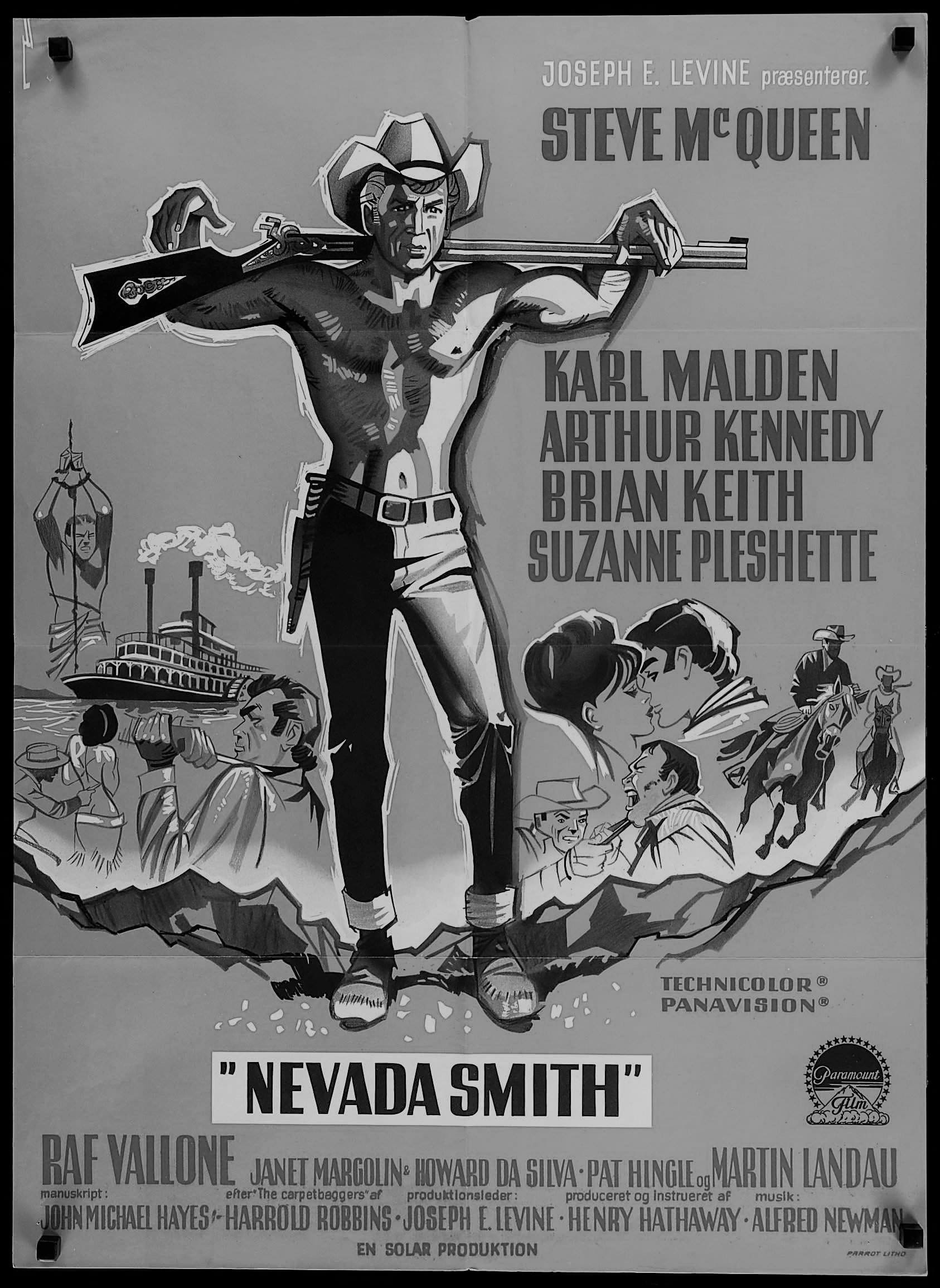 NEVADA SMITH (1966)
NEVADA SMITH (1966) (135 Min.) Genre: 1960 ACTION, Transfer Quality: A
Henry Hathaway's film is based on a character from Harold Robbins' The Carpetbaggers, who, in turn, based it on cowboy actor Ken Maynard. Set in the West of the 1890s, the film opens with the torture and murder of the parents of Max Sand (Steve McQueen) by a trio of gunslingers seemingly motivated by their hostility toward the mixed nature of the marriage, since the wife is a Native American. Swearing revenge, the young cowhand enlists the help of itinerant gunsmith Jonas Cord Brian Keith, who teaches him how to shoot while counseling against revenge. Nonetheless, Sand doggedly scours one town after the other before finally running up against one of the murderers, Jesse Coe (Martin Landau). He finally kills Coe in a vicious knife fight, but is severely wounded himself and has to be nursed back to health by Neesa (Janet Margolin), a young Kiowa woman. He next heads for Louisiana where another of the murderous trio, Bill Bowdre (Arthur Kennedy), is serving a prison sentence in a remote swamp. In order to get close to the man, Sand stages a robbery, and is soon among the prison inmates. This was the only film on which McQueen worked with Landau, the only other person admitted to the Actor's Studio out of thousands of applicants in 1957.
Starring: Steve McQueen, Karl Malden, Brian Keith, Arthur Kennedy, Suzanne Pleshette, Martin Landau | Directed by: Henry Hathaway
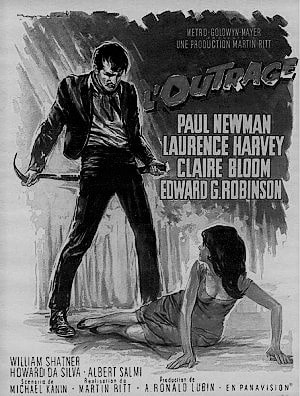 OUTRAGE, THE (1964)
OUTRAGE, THE (1964) (95 Min.) Genre: 1960 ACTION, Transfer Quality: B
Derived from the classic 1951 Japanese film Rashomon, director Martin Ritt's The Outrage attempts to modernize the original story of rape and murder, transporting from medieval Japan to the American Southwest of the 1870's. The story is told within the framework of three men waiting at a railway station. A con-man (Edward G. Robinson) listens to the account of a trial held recently in the town as told by a prospector (Howard Da Silva) and a preacher (William Shatner) suffering from a crisis of faith in humanity. Three witnesses at the trial of a Mexican outlaw give conflicting testimony. Each version is shown in flashback. The outlaw, Juan Carrasco (Paul Newman), confesses that he bound the husband (Laurence Harvey), raped the wife, and killed the husband in a duel of honor. The wife (Claire Bloom) claims that the outlaw raped her, and then she stabbed her husband when he contemptuously blamed her for inviting the assault. The third witness, an old Indian (Paul Fix), declares that he found the dying husband who stated that he stabbed himself because he couldn't live with the humiliation. As the story continues to unfold, the validity of each of the stories is questioned before the truth is finally revealed.
Starring: Paul Newman, Laurence Harvey, Claire Bloom, Edward G. Robinson, William Shatner, Howard Da Silva | Directed by: Martin Ritt
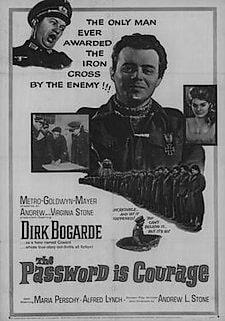 PASSWORD IS COURAGE, THE (1963)
PASSWORD IS COURAGE, THE (1963) (115 Min.) Genre: 1960 ACTION, Transfer Quality: A
Based on the true story of Sergeant-Major Charlie Coward (played by Dirk Bogarde) during World War II, this conventional wartime drama does not convincingly put across Coward's heroism, or his seemingly impossible exploits. A German POW and leader in Stalag 8B, Coward finds ways to humiliate his German captors whenever he can, but most importantly he and the men under him are working out an escape. They have already dug out a 280-foot tunnel, and now Coward has to somehow reach the Polish resistance fighters in order to get the necessary maps and money before exiting through the tunnel. To that end, he gets put in charge of prisoners at a lumber yard, burns the place down, blames it on a German officer, and manages to get an afternoon off in town if he does not rat on the officer. That time off allows him to contact the resistance movement and get the supplies he needs. And this is only the beginning of several adventures that Coward somehow survives. — Eleanor Mannikka
Starring: Dirk Bogarde, Maria Perschy, Alfred Lynch, Nigel Stock | Directed by: Andrew L. Stone
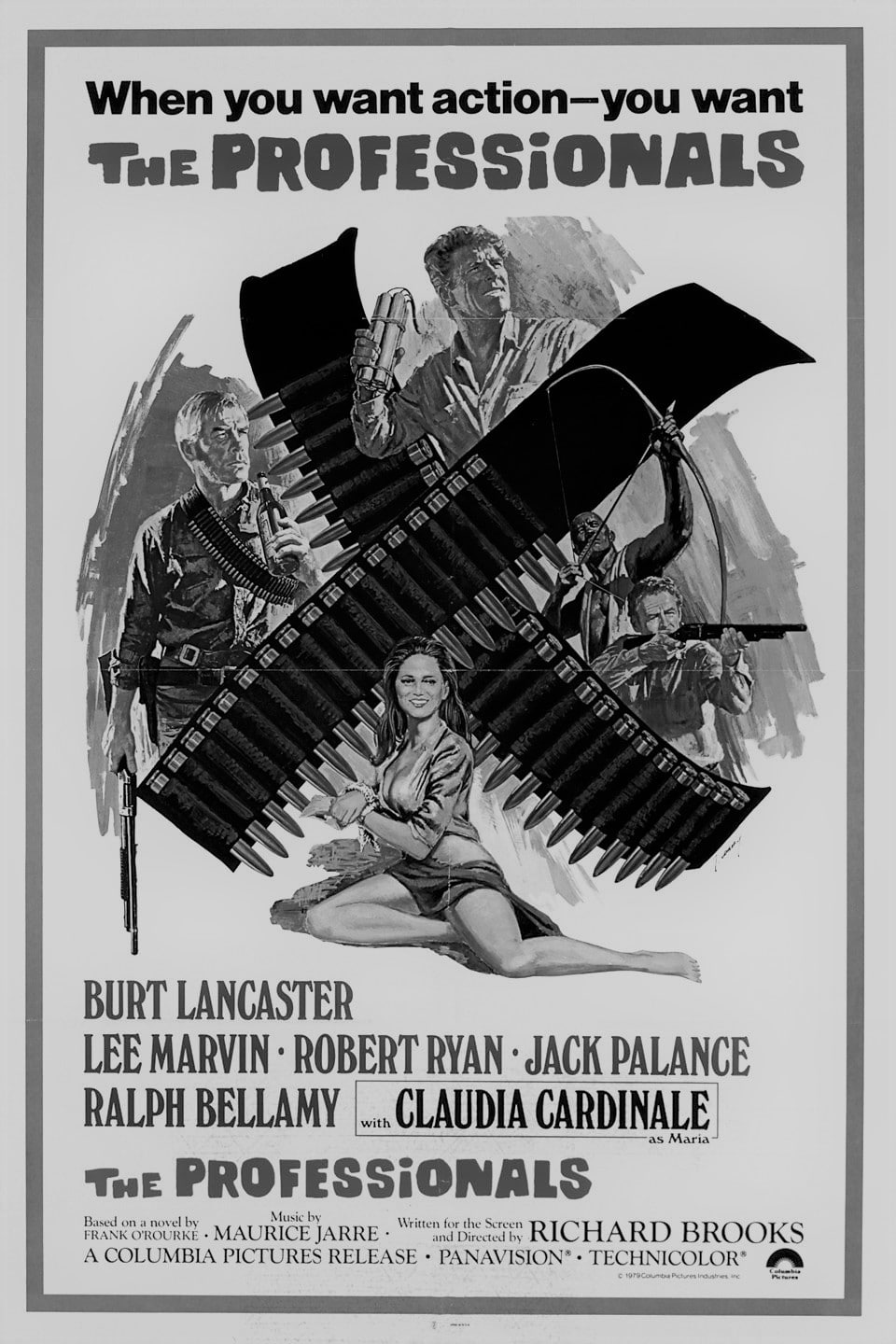 PROFESSIONALS, THE (1966)
PROFESSIONALS, THE (1966) (118 Min.) Genre: 1960 ACTION, Transfer Quality: A
Grant (Ralph Bellamy) is a wealthy rancher who hires a trio of mercenaries to retrieve his wife Maria (Claudia Cardinale) from the clutches of the desperado Raza (Jack Palance) in this western adventure set in 1917. Dolworth (Burt Lancaster) is a munitions expert who joins gunslinger Fardan (Lee Marvin) and longbow master Jake (Woody Strode) after being offered $10,000 apiece for the safe return of Grant's kidnapped wife. The trio travels 100 miles into Mexico to retrieve the woman, who they later discover wants to remain with Raza. Soon the four are chased across the border by the enraged Raza and his equally deadly female accomplice Chiquita (Marie Gomez). The film received Academy Award nominations for "Best Direction" (Richard Brooks), "Best Screenplay" (Brooks again), and "Best Cinematography" (Conrad L. Hall). — Dan Pavlides
Starring: Burt Lancaster, Lee Marvin, Robert Ryan, Jack Palance, Claudia Cardinale | Directed by: Richard Brooks
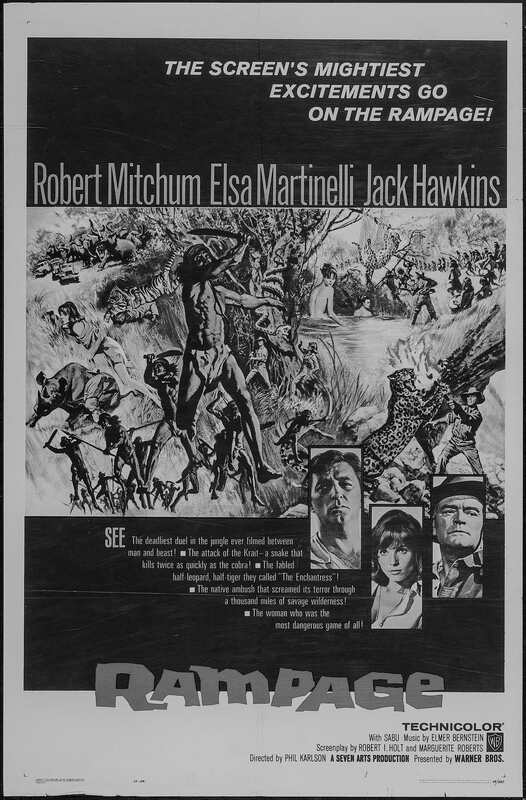 RAMPAGE (1963)
RAMPAGE (1963) (98 Min.) Genre: 1960 ACTION, Transfer Quality: B
In this South Seas adventure, an internationally renowned big-game hunter is engaged by a German zoo to find and capture a rare Malaysian cat that is half-tiger and half-leopard. He is accompanied by another hunter and his young mistress. The other hunter is much older and subject to bouts of paranoia. While in the jungle, his behavior becomes increasingly erratic and accuses his mistress and the hero of having an affair. While it is true that they are mutually attracted, they have not acted upon their feelings. After catching the elusive cat, they return to Germany where the mistress finally tells her older lover about her feelings. He reacts by freeing the great cat so it will kill the younger man. Instead the "tiggoard" kills everyone but the hero. The old hunter then ends up trying to kill the would be lovers with his gun. Fortunately the concealed kitty leaps out and kills him first.
Starring: Robert Mitchum, Elsa Martinelli, Jack Hawkins, Sabu | Directed by: Phil Karlson
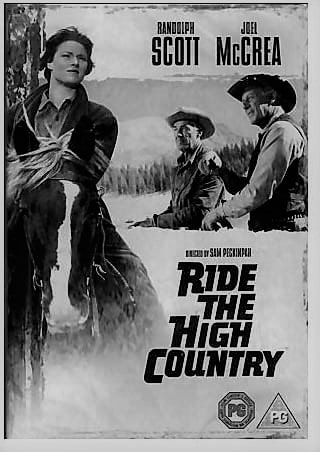 RIDE THE HIGH COUNTRY (1962)
RIDE THE HIGH COUNTRY (1962) (94 Min.) Genre: 1960 ACTION, Transfer Quality: A
Sam Peckinpah's feature film directorial debut was intended as the cinematic swan song for both Randolph Scott and Joel McCrea; while McCrea would unexpectedly emerge from retirement, this 1961 western serves as an excellent valedictory for both men. The time is the early 1900s, when the Old West was slowly and stubbornly giving way to the new. McCrea plays Steve Judd, an ex-lawman living on the fringes of poverty but maintaining his dignity and honesty. Hired to escort a gold shipment from the wide-open mining town of Coarse Gold, he engages his old pal Gil Westrum (Scott) to help him. But Gil hasn't Steve's integrity, and he and his young saddle pal Heck Longtree (Ronald Starr) hope to talk Steve into helping them steal the gold. En route to Coarse Gold, the three riders spend the night at the farm of a religious fanatic (R.G. Armstrong), whose daughter Elsa (Mariette Hartley in her film debut), chafing at her father's loud piety, is planning to elope with her boyfriend Billy (James Drury). The next day, Elsa insists on joining up with the group so she can marry Billy at Coarse Gold, leading to numerous complications and, of course, a final shoot-out that allows Steve and Gil to reconcile their differences and pave the way for the film's elegiac finale. Released at the tail end of the western genre, and virtually thrown away by MGM, Ride the High Country feels like an elegy for the western itself — and Peckinpah himself would go on to revise western conventions with such later efforts as The Wild Bunch (1969) and Pat Garrett and Billy the Kid (1973). — Hal Erickson
Starring: Randolph Scott, Joel McCrea, Mariette Hartley, Ron Starr | Directed by: Sam Peckinpah
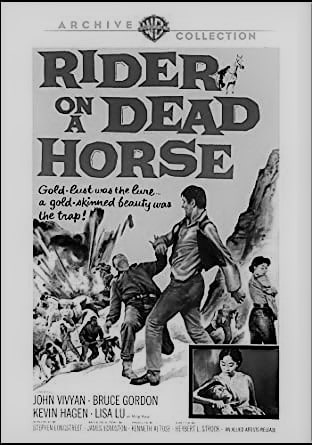 RIDER ON A DEAD HORSE (1962)
RIDER ON A DEAD HORSE (1962) (72 Min.) Genre: 1960 ACTION, Transfer Quality: B
In this western a trio of prospectors bury their booty to keep the Apaches away. As one of the three rides away, another of them shoots him in the back. The killer allows only the hero to live as he is the only one who really knows where the gold is located. Later the Apaches attack and force the men to leave their horses. When the dead man's horse gallops by, the killer shoots the hero and rides away on his horse. Unbeknownst to him, he did not kill this man, who is later found and healed by a Chinese woman who hopes that when he is healed, he will take her to San Francisco. Meanwhile the killer has conned a bounty hunter into believing the hero killed the second partner. These two agree to split the reward and take off after the third man. The bounty hunter finds him with the girl while the killer rides off to get the gold. The hero man then gets locked in jail and the young woman must take the other to the burial site. Fortunately, the hero escapes and takes off to save her. At the burial site, the bounty hunter accidentally detonates some dynamite and blows the gold to smithereens causing the killer to truly lose his mind and attack the girl. Fortunately he is shot down by the hero who arrives at the crucial moment and then rides away with the girl.
Starring: Bruce Gordon, Kevin Hagen, Charles Lampkin, Lisa Lu | Directed by: Herbert L. Strock
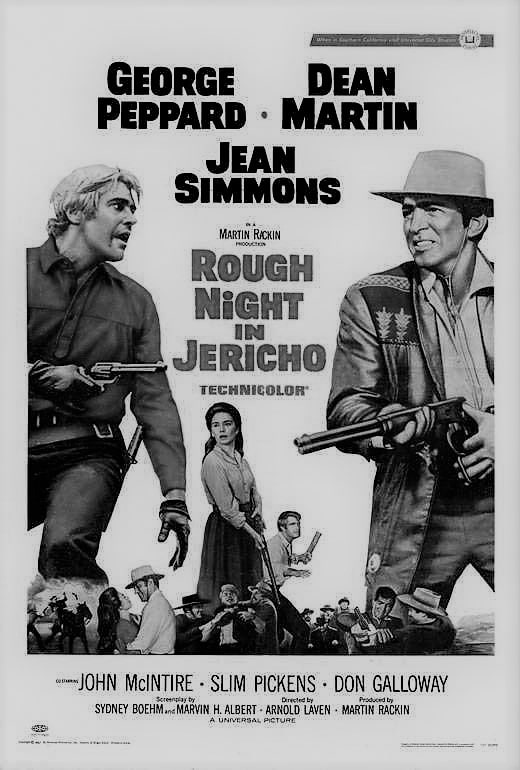 ROUGH NIGHT IN JERICHO (1967)
ROUGH NIGHT IN JERICHO (1967) (104 Min.) Genre: 1960 ACTION, Transfer Quality: B
This typical western tale of beleaguered townsfolk mustering up the courage to fight the villain that controls their town with an iron fist features atypically bloody violence. Supposedly the top peacekeeper in the frontier town of Jericho, Sheriff Alex Flood (Dean Martin) is actually a ruthless bully and racketeer who owns or profitably intimidates every enterprise in Jericho with the help of his henchmen, including the Yarbrough (Slim Pickens). That is, every business except the lucrative stagecoach line run by the widow Molly Lang (Jean Simmons) and Hickman (John McIntire). Predictably, Flood wants command of the stage business, too, but Lang resists him, even when threatened with bodily harm. Tough gambler Dolan (George Peppard), a former marshal, rides into town intending to work for Lang as a driver, but when he learns of the tension between Lang and Flood he backs off, not wanting any trouble. However, when Yarbrough is caught by Lang trying to sabotage a coach on her property, the thug savagely beats her, forcing Dolan to get involved.
Starring: Dean Martin, George Peppard, Jean Simmons, John McIntire, Slim Pickens, Don Galloway | Directed by: Arnold Laven
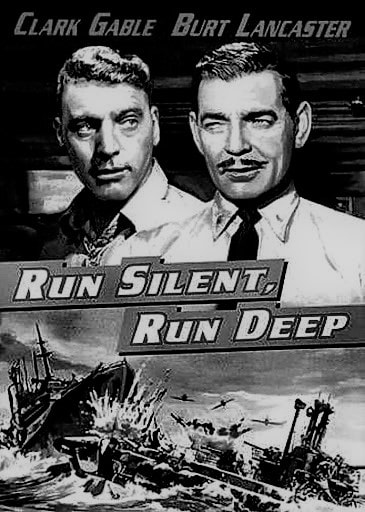 RUN SILENT, RUN DEEP (1958)
RUN SILENT, RUN DEEP (1958) (93 Min.) Genre: 1960 ACTION, Transfer Quality: A
The contrasting acting styles of Clark Gable and Burt Lancaster serve to increase the already high tension level of the WW2 drama Run Silent, Run Deep. Gable plays submarine commander "Rich" Richardson, who assumes command of the USS Nerka. Because his previous sub was sunk by the Japanese under highly suspect circumstances, Richardson inspires nothing but animosity from his new crew. Particularly hostile is executive officer Lt. Jim Bledsoe (Burt Lancaster), who'd assumed that he was next in line to command the Nerka. Obsessed with tracking down the Japanese destroyer that sank his old sub, Richardson drives his crew mercilessly, and even disobeys direct orders from his own higher-ups. The Nerka manages to blast the Japanese vessel out of the waters, but in so doing the sub is placed in dire peril in enemy waters. In his desperate efforts to save the Nerka, Richardson at long last wins the respect of Bledsoe and the rest of the crew. Featured in the cast of Run Silent, Run Deep are Burt Lancaster's old circus partner Nick Cravat, and, in his unbilled movie debut, Don Rickles.
Starring: Clark Gable, Burt Lancaster, Jack Warden, Brad Dexter, Don Rickles | Directed by: Robert Wise
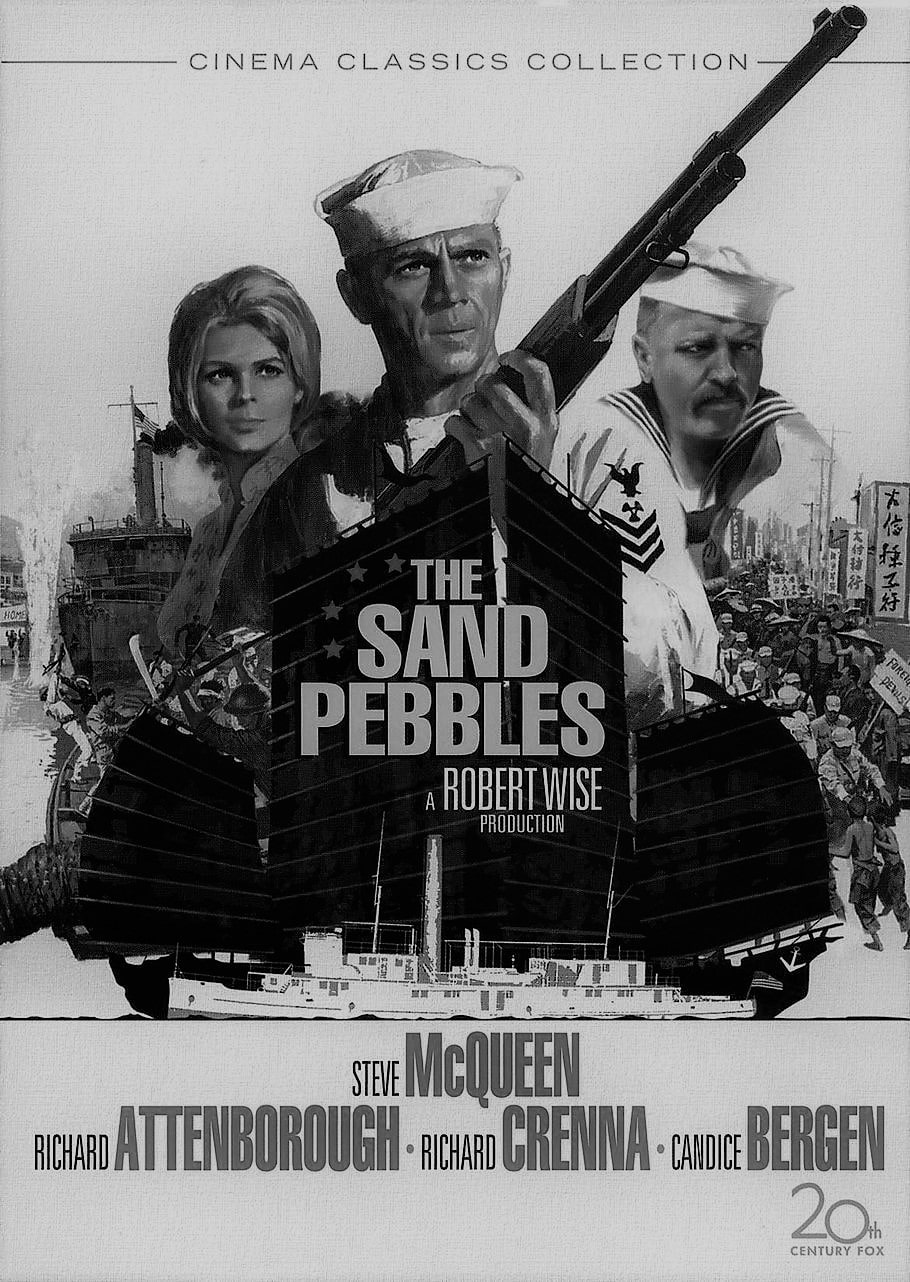 SAND PEBBLES, THE (1966)
SAND PEBBLES, THE (1966) (193 Min.) Genre: 1960 ACTION, Transfer Quality: A
Steve McQueen received his only Academy Award nomination for his performance in this epic-scale war drama, based on the novel by Richard McKenna. In 1926, as China teeters on the edge of political revolution in the midst of a civil war, the USS San Pablo, is ordered to patrol the Yangtze River to represent and protect American interests. While the San Pablo may be an American ship, much of the labor is actually performed by Chinese locals willing to work for American money, while stern but inexperienced commanding officer Captain Collins (Richard Crenna) frequently drills his charges, unsure what else to do. A machinist's mate with just under a decade of navy service behind him, Jake Holman (Steve McQueen) is assigned to the San Pablo and immediately makes enemies among the crew -- he prefers to do his own work rather than farm it out to others, and the one Chinese man who works by his side, Po Han (Mako), is treated as an apprentice rather than a servant. Holman also falls in love with an idealistic American missionary (Candice Bergen), while his shipmate Frenchy (Richard Attenborough) falls for a Chinese girl and - with marriage plans in mind - kidnaps her to prevent her from being auctioned off. As Holman's methods and attitudes continue to anger his comrades, they find themselves increasingly at odds with the Chinese, especially after Frenchy's girlfriend becomes pregnant and Po Han is captured by revolutionary forces and branded a traitor.
Starring: Steve McQueen, Richard Attenborough, Candice Bergen, Richard Crenna, Mako | Directed by: Robert Wise
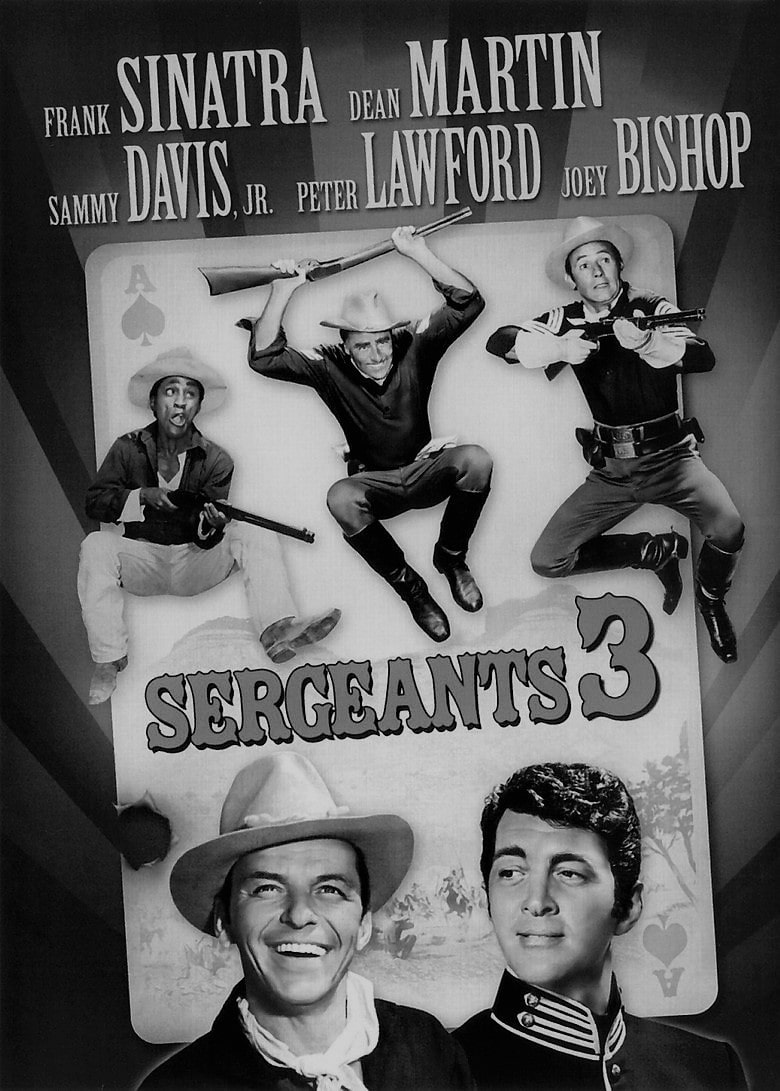 SERGEANTS 3 (1962)
SERGEANTS 3 (1962) (113 Min.) Genre: 1960 ACTION, Transfer Quality: A
The 1939 adventure classic Gunga Din is transferred from British India to the American West, courtesy of Frank Sinatra's "Clan." Sinatra, Dean Martin and Peter Lawford play three cavalry officers, always ready for a brawl but willing to die for each other if need be. Sammy Davis Jr. a cavalry bugler who has aspirations of being a combat soldier. The three officers and the bugler take on a Napoleonic Native American chief, who plans to unify all the tribes and kill every white man in sight. Davis does his "Gunga" bit by blowing his bugle and warning the approaching cavalry that they're riding into a trap. About all that isn't pilfered from Gunga Din is the death of the noble bugler; Davis survives being shot up by the Indians with little more than a flesh wound! Sergeants Three also stars another Sinatra crony, Joey Bishop, playing the role originally essayed in Gunga Din by Robert Coote.
Starring: Frank Sinatra, Dean Martin, Sammy Davis, Jr, Peter Lawford, Joey Bishop | Directed by: John Sturges
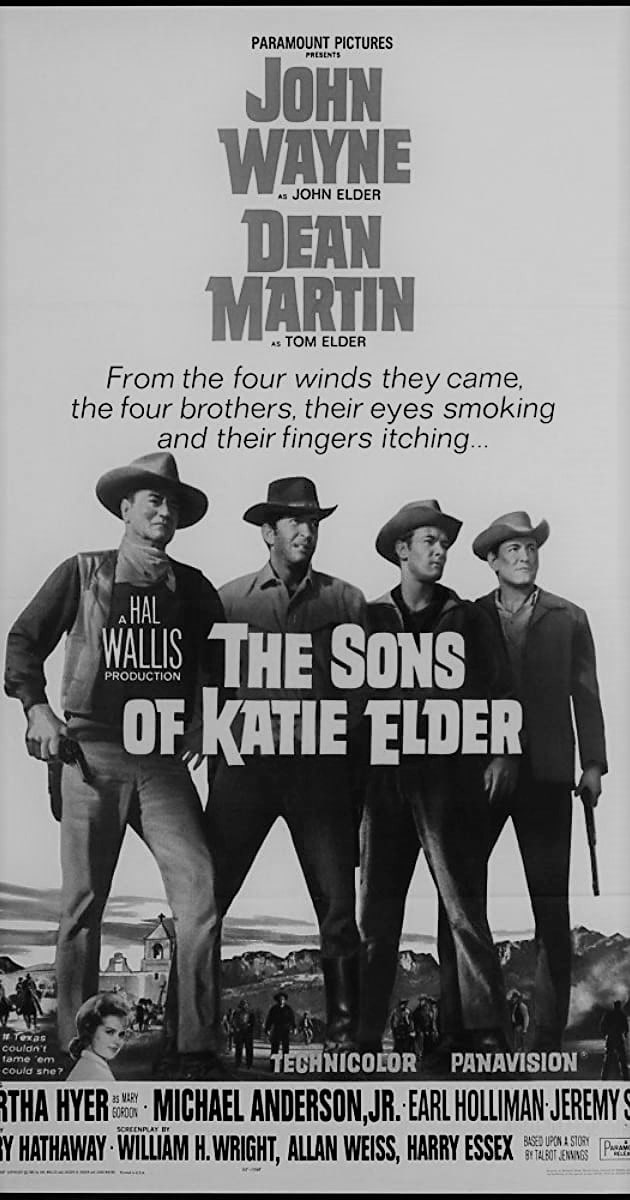 SONS OF KATIE ELDER, THE (1965)
SONS OF KATIE ELDER, THE (1965) (122 Min.) Genre: 1960 ACTION, Transfer Quality: A
Henry Hathaway directs the 1965 psychological Western The Sons of Katie Elder. Four sons reunite in their Texas hometown to attend their mother's funeral. John (John Wayne) is the gunfighter, Tom (Dean Martin) is the gambler, Matt (Earl Holliman) is the quiet one, and Bud (Michael Anderson Jr.) is the youngest. They soon learn that their father gambled away the family ranch, leading to his own murder. The brothers decide to find their father's killer and get back the ranch, even though they are discouraged to do so by local Sheriff Billy Wilson (Paul Fix). When the sheriff turns up dead, the Elder boys are blamed for the murder. Deputy Sheriff Ben Latta (Jeremy Slate) joins forces with the only witnesses of the murder: Morgan Hastings (James Gregory) and his son Dave (Dennis Hopper). A gunfight breaks out between the Hastings gang and the Elder gang. After his brother Matt is killed, John decides to settle the ranch dispute in a court of law with a judge (Sheldon Allman). However, Tom decides to take matters into his own hands by kidnapping Dave. After the final climactic gunfight, John and the wounded Bud retreat to a rooming house owned by Mary Gordon (Martha Hyer).
Starring: John Wayne, Dean Martin, Martha Hyer, Earl Holliman, Dennis Hopper, Jeremy Slate, James Gregory, George Kennedy | Directed by: Henry Hathaway
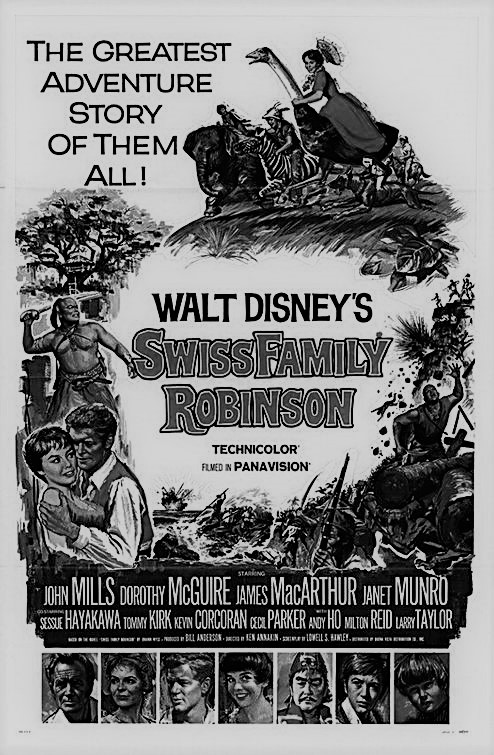 SWISS FAMILY ROBINSON (1960)
SWISS FAMILY ROBINSON (1960) (126 Min.) Genre: 1960 ACTION, Transfer Quality: A
None of the many cinemadaptations of Johan Wyss' The Swiss Family Robinson are as relentlessly enjoyable as this 1960 Disney feature. The film wastes no time getting down to business, with the shipwreck of the Robinson family occurring as the credits flash across the screen. Fashioning a raft, the family heads to a lush tropical island. While the mother (Dorothy McGuire) isn't too happy about being a castaway, the father (John Mills) and the sons (James MacArthur, Tommy Kirk, Kevin Corcoran) are thrilled at the prospect of carving out a new life for themselves. In short order, the industrious Robinsons have constructed a treehouse with all the creature comforts and "utilities" of their home in Switzerland. Later on, the little party is joined by Janet Munro, the daughter of a sea captain who has been captured by pirate Sessue Hayakawa and his band. After a series of adventures calculated to arouse the envy of every man, woman and child in the audience, the film comes to a rousing conclusion as the Robinsons resourcefully fend off Hayakawa and his pirates with a variety of jerry-built booby traps. A box-office winner to the tune of $30 million, The Swiss Family Robinson proved beyond doubt that Disney's decision to emphasize the humor and adventure of the Wyss original, while downplaying the sociopolitical undertones, was a sound one.
Starring: John Mills, Dorothy McGuire, James MacArthur, Janet Munro, Sessue Hayakawa, Tommy Kirk | Directed by: Ken Annakin
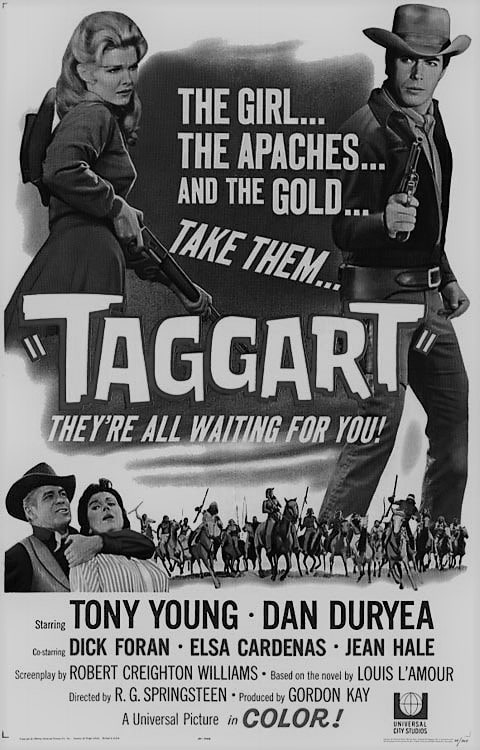 TAGGART (1964)
TAGGART (1964) (85 Min.) Genre: 1960 ACTION, Transfer Quality: B
In this western, the trouble begins when a rancher's mother and father are killed by a young outlaw and his family who want his land. The son returns the favor and slaughters them. As the father lies dying, he manages to hire three gunslingers to track the boy down. The boy is a good shot though and kills two of the hired guns and then flees into Indian territory. There he meets an old miner, his wife and their daughter. The remaining gunslinger finds him, but is taken prisoner by the miner. Later, the saucy wife makes a pass at the young man, but he rejects her. In retaliation, she frees the gunman, steals her husband's gold and takes off. She ends up being killed by the Indians. Meanwhile, the daughter, the miner, and the rancher's son are busy fighting off an attack of their own. They then ride off after the fleeing gunman whose horse is so laden down with gold that it collapses. This allows the son to shoot him dead. Afterwards, the son and the miner's daughter get hitched and live happily ever after.
Starring: Tony Young, Dan Duryea, Dick Foran, Elsa Cardenas | Directed by: R. G. Springsteen
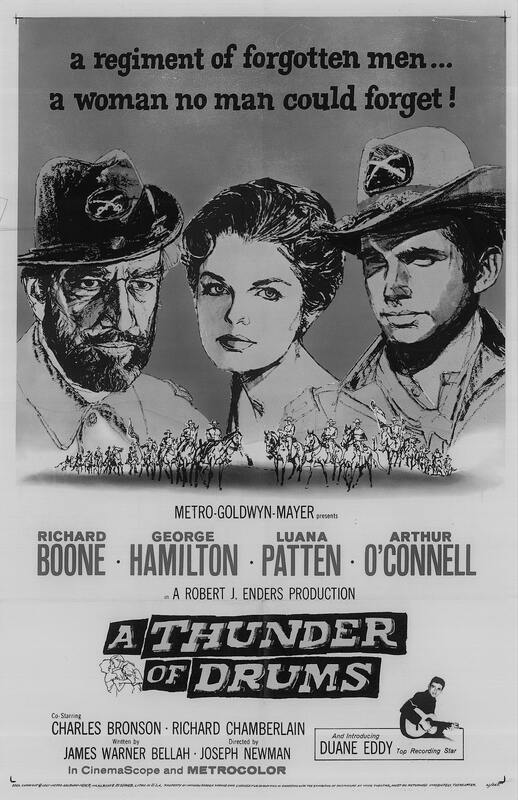 THUNDER OF DRUMS, A (1961)
THUNDER OF DRUMS, A (1961) (97 Min.) Genre: 1960 ACTION, Transfer Quality: B
In this western, an idealistic and naive rookie cavalry officer is assigned to work with a cruel captain. He immediately gets on the crabby captain's bad side by trying to restart an affair with his ex-sweetheart. The woman is engaged to another who ends up getting killed by the Indians. This rookie, blaming himself for distracting the slain officer with his overtures to the officer's fiance, volunteers to act as a decoy to lure the renegade Apaches into a trap. It works, but many soldiers die. After the skirmish, the rookie has become a seasoned officer prepared to take his duties seriously. Back at the fort, he bids farewell to the woman as she begins her long journey back east.
Starring: Richard Boone, George Hamilton, Arthur O'Connell, Charles Bronson, Richard Chamberlain | Directed by: Joseph Newman
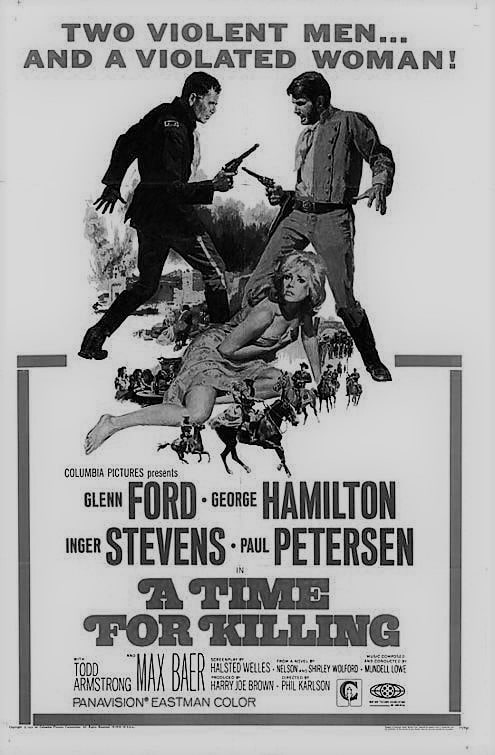 TIME FOR KILLING, A (1967)
TIME FOR KILLING, A (1967) (83 Min.) Genre: 1960 ACTION, Transfer Quality: B
The Long Ride Home is the British title for the Columbia Civil War western A Time for Killing. The stars are Glenn Ford, a regular of sagebrushers, and Inger Stevens, a relative newcomer to the genre who between 1967-1970 made up for lost time with such films as Hang 'Em High and Firecreek. Ford is Union POW camp commander Major Walcott who rides out to capture escaped Confederate prisoner Captain Bentley (George Hamilton). Bentley and his men have kidnapped Walcott's fiancee Emily Biddle (Stevens) to assure themselves safe passage, but several of the escaped Rebs hope to divest themselves of Bentley and have their way with their beautiful captive. Among the troops is a very young Harrison Ford, collecting his meager Columbia contract paycheck and hoping for better days.
Starring: George C. Scott, Glenn Ford, Michael Parks, George Hamilton, Inger Stevens, Harrison Ford | Directed by: Phil Karlson
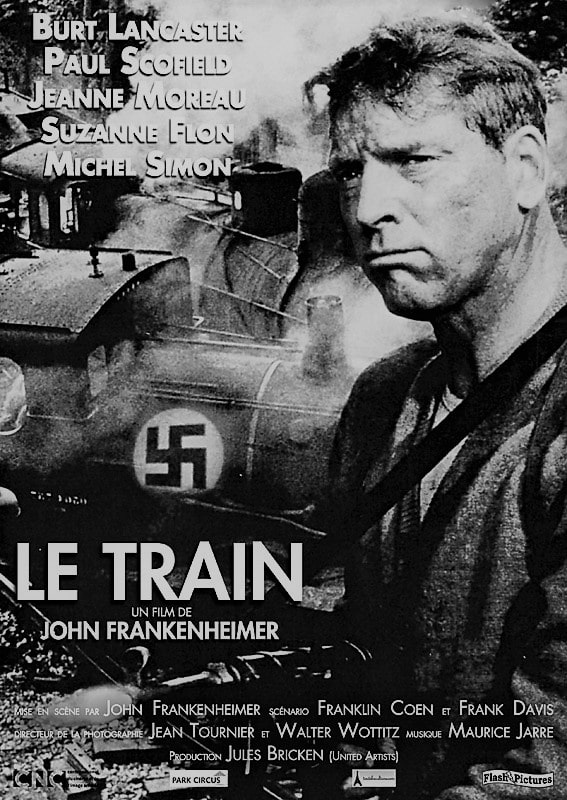 TRAIN, THE (1964)
TRAIN, THE (1964) (133 Min.) Genre: 1960 ACTION, Transfer Quality: A
John Frankenheimer directs Burt Lancaster in the tense spy thriller The Train. Lancaster plays Labiche, a French railway inspector. Allied forces are threatening to liberate Paris, so Col. Franz von Waldheim (Paul Scofield) is ordered to move the priceless works of art from the Jeu de Paume Museum to the fatherland. The head of the museum (Suzanne Flon) attempts to convince Labiche that he should sabotage the train on which they are transporting the art. Labiche is more focused on destroying a trainload of German weapons. After his friend is killed trying to stop the train with the art, and after a consciousness-raising conversation with a hotel owner (Jeanne Moreau), Labiche resolves to save the antiquities. Lancaster and Frankenheimer had worked together previously on both Birdman of Alcatraz and Seven Days in May. — Perry Seibert
Starring: Burt Lancaster, Paul Scofield, Jeanne Moreau, Michel Simon | Directed by: John Frankenheimer
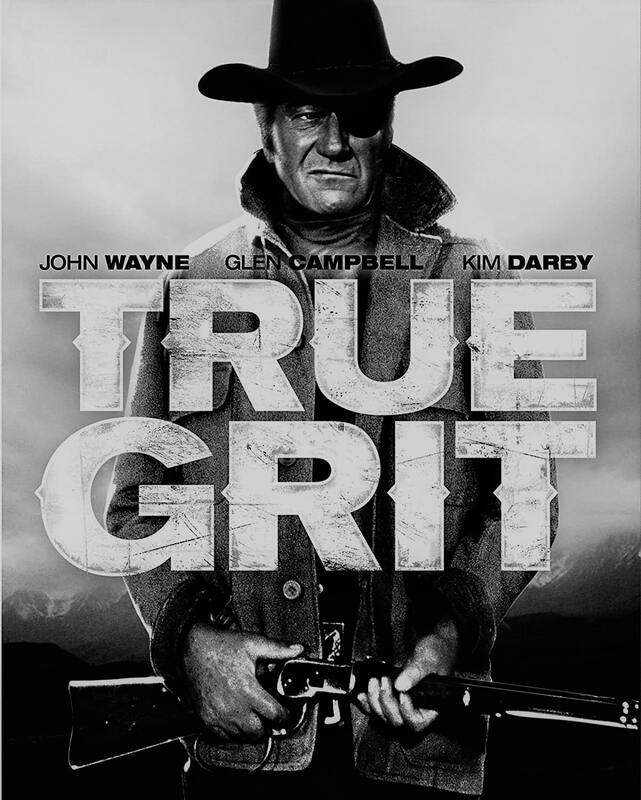 TRUE GRIT (1969)
TRUE GRIT (1969) (128 Min.) Genre: 1960 ACTION, Transfer Quality: A
In fine Hollywood tradition, John Wayne had to play a "one-eyed fat man" before the Motion Picture Academy considered him worthy of an Oscar. In True Grit, Wayne plays grumpy, pot-bellied U.S. marshal "Rooster" Cogburn, hired by 14-year-old Mattie Ross (Kim Darby) to find Tom Chaney (Jeff Corey), who killed her father. The headstrong Mattie could have had her pick of lawmen, but selects the aging Cogburn because she believes he has "true grit" (she talks this way all through the picture, so be prepared). Also heading into Indian territory in search of Chaney is Texas Ranger La Boeuf (Glen Campbell), who wants to collect the reward placed on the fugitive's head for his earlier crimes. Complicating matters are Chaney's scurrilous cronies Ned Pepper (Robert Duvall), Quincy (Jeremy Slate), and Moon (Dennis Hopper), who have no qualms about killing a troublesome teenaged girl like Mattie. While the plot of True Grit, adapted (and streamlined) by Marguerite Roberts from the novel by Charles Portis, maintains audience interest throughout, the glue that truly holds this Western together is John Wayne, delivering one of his finest performances (though some believe he was better in She Wore a Yellow Ribbon). Wayne's casual charisma is infinitely more effective than the mannered method acting of Kim Darby and the floundering non-acting of poor Glen Campbell. And who could not love the climatic face-off between Duvall and company and John Wayne, whose "Fill your hand, you son of a bitch!" is not only a classic bit of dialogue, but the apotheosis of the Wayne mystique. In 1975, Wayne repeated his True Grit characterization opposite Katharine Hepburn in Rooster Cogburn, but the film failed to match its predecessor and the overall effect was blunted.
Starring: John Wayne, Glen Campbell, Kim Darby, Jeremy Slate, Robert Duvall, Dennis Hopper, Strother Martin, Jeff Corey | Directed by: Henry Hathaway
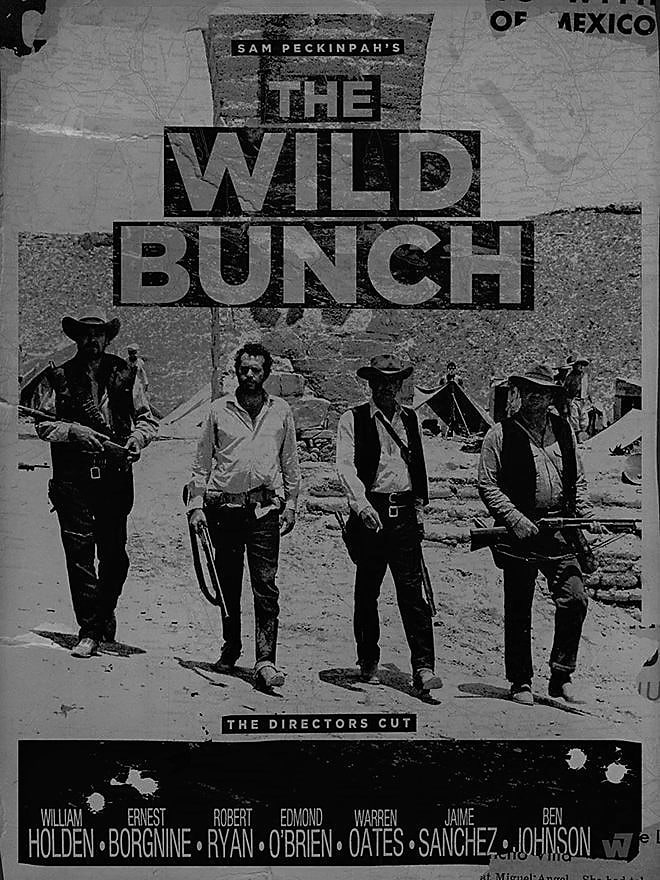 WILD BUNCH, THE (1969)
WILD BUNCH, THE (1969) (145 Min.) Genre: 1960 ACTION, Transfer Quality: A
"If they move, kill 'em!" Beginning and ending with two of the bloodiest battles in screen history, Sam Peckinpah's classic revisionist Western ruthlessly takes apart the myths of the West. Released in the late '60s discord over Vietnam, in the wake of the controversial Bonnie and Clyde (1967) and the brutal "spaghetti westerns" of Sergio Leone, The Wild Bunch polarized critics and audiences over its ferocious bloodshed. One side hailed it as a classic appropriately pitched to the violence and nihilism of the times, while the other reviled it as depraved. After a failed payroll robbery, the outlaw Bunch, led by aging Pike Bishop (William Holden) and including Dutch (Ernest Borgnine), Angel (Jaime Sanchez), and Lyle and Tector Gorch (Warren Oates and Ben Johnson), heads for Mexico pursued by the gang of Pike's friend-turned-nemesis Deke Thornton (Robert Ryan). Ultimately caught between the corruption of railroad fat cat Harrigan (Albert Dekker) and federale general Mapache (Emilio Fernandez), and without a frontier for escape, the Bunch opts for a final Pyrrhic victory, striding purposefully to confront Mapache and avenge their friend Angel.
Starring: William Holden, Ernest Borgnine, Robert Ryan, Edmond O'Brien, Warren Oates, Ben Johnson | Directed by: Sam Peckinpah

